Table of Contents
- Safety information
- Important safety symbols and precautions:
- Severe warning signs for transportation and site
- Critical installation warnings
- Installation cautions
- Critical usage warnings
- Usage warning
- Usage cautions
- Cleaning cautions
- Critical disposal warnings
- Additional tips for proper usage
- Saving Energy Tips
- This appliance is intended to be used in household and similar applications such as
- Instructions about the WEEE
- Installation
- Operations
- Maintenance
- Troubleshooting
Samsung RZ32M7135WW/ES User Manual
Displayed below is the user manual for RZ32M7135WW/ES by Samsung which is a product in the Freezers category. This manual has pages.
Related Manuals

Refrigerator
User manual (freezer only)
RZ32M*
Free Standing Appliance
Untitled-51 1 2017-03-09 5:07:41

English2
Contents
Contents
Safety information 3
Important safety symbols and precautions: 5
Severe warning signs for transportation and site 6
Critical installation warnings 6
Installation cautions 10
Critical usage warnings 10
Usage warning 15
Usage cautions 16
Cleaning cautions 18
Critical disposal warnings 19
Additional tips for proper usage 20
Saving Energy Tips 21
This appliance is intended to be used in household and similar applications such as 22
Instructions about the WEEE 23
Installation 24
Refrigerator at a glance 24
Step-by-step installation 25
Operations 32
Feature panel 32
Samsung Smart Home 35
Special features 37
Maintenance 42
Door reversal (applicable models only) 42
Handle and care 59
Cleaning 62
Replacement 62
Troubleshooting 63
General 63
Do you hear abnormal sounds from the refrigerator? 65
Samsung Smart Home 67
Untitled-51 2 2017-03-09 5:07:41

English 3
Safety information
• Before using your new Samsung Refrigerator, please read
this manual thoroughly to ensure that you know how to
operate the features and functions that your new appliance
offers safely and efciently.
• This appliance is not intended for use by persons
(including children) with reduced physical, sensory, or
mental capabilities, or those who lack experience and
knowledge, unless they have been given supervision or
instruction concerning the use of the appliance by a person
responsible for their safety.
• This appliance can be used by children aged from 8 years
and above and persons with reduced physical, sensory or
mental capabilities or lack of experience and knowledge
if they have been given supervision or instruction
concerning use of the appliance in a safe way and
understand the hazards involved.
Children shall not play with the appliance. Cleaning and
user maintenance shall not be made by children without
supervision.
• Warnings and Important Safety Instructions in this manual
do not cover all possible conditions and situations that
may occur.
It is your responsibility to use common sense, caution,
and care when installing, maintaining, and operating your
appliance.
Safety information
Untitled-51 3 2017-03-09 5:07:41

Safety information
English4
Safety information
• Because these following operating instructions cover
various models, the characteristics of your refrigerator
may differ slightly from those described in this manual and
not all warning signs may be applicable. If you have any
questions or concerns, contact your nearest service center
or nd help and information online at www.samsung.com.
• In order to avoid the creation of a ammable gas-air
mixture if a leak in the refrigerating circuit occurs, the size
of the room in which the appliance may be sited depends
on the amount of refrigerant used.
• Never start up an appliance showing any signs of damage.
If in doubt, consult your dealer. The room must be 1 m³
in size for every 8 g of R-600a refrigerant inside the
appliance. The amount of refrigerant in your particular
appliance is shown on the identication plate inside the
appliance.
• Refrigerant squirting out of the pipes could ignite or cause
an eye injury. When refrigerant leaks from the pipe, avoid
any naked ames and move anything ammable away
from the product and ventilate the room immediately.
- Failing to do so may result in re or explosion.
• It is hazardous for anyone other than an Authorised
Service Person to service this appliance.
• Do not store explosive substances such as aerosol cans
with a ammable propellant in this appliance.
Untitled-51 4 2017-03-09 5:07:41

English 5
Safety information
Important safety symbols and precautions:
Please follow all safety instructions in this manual. This
manual uses the following safety symbols.
WARNING
Hazards or unsafe practices that may result in severe personal
injury, property damage, and/or death.
CAUTION
Hazards or unsafe practices that may result in severe personal
injury and/or property damage.
NOTE
Useful information that helps users understand or benet
from the refrigerator.
These warning signs are here to prevent injury to you and
others.
Please follow them carefully.
After reading this section, keep it in a safe place for future
reference.
Untitled-51 5 2017-03-09 5:07:41

Safety information
English6
Safety information
Severe warning signs for transportation and site
WARNING
• When transporting and installing the appliance, care should
be taken to ensure that no parts of the refrigerating circuit
are damaged.
- Refrigerant leaking from the pipe work could ignite
or cause an eye injury. If a leak is detected, avoid any
naked ames or potential sources of ignition and air
the room in which the appliance is standing for several
minutes.
- This appliance contains a small amount of isobutane
refrigerant (R-600a), a natural gas with high
environmental compatibility that is, however, also
combustible. When transporting and installing the
appliance, care should be taken to ensure that no parts
of the refrigerating circuit are damaged.
Critical installation warnings
WARNING
• Do not install the refrigerator in a damp location or place
where it may come in contact with water.
- Deteriorated insulation on electrical parts may cause an
electric shock or re.
• Do not place this refrigerator in direct sunlight or expose it
to the heat from stoves, room heaters, or other appliances.
Untitled-51 6 2017-03-09 5:07:41

English 7
Safety information
• Do not plug several appliances into the same multiple
power strip. The refrigerator should always be plugged
into its own individual electrical outlet which has a voltage
rating that matches the voltage listed on the refrigerator’s
rating plate.
- This provides the best performance and also prevents
overloading of house wiring circuits, which could cause
a re hazard from overheated wires.
• If the wall socket is loose, do not insert the power plug.
- There is a risk of electric shock of re.
• Do not use a power cord that has cracks or abrasion
damage along its length or at either end.
• Do not bend the power cord excessively or place heavy
objects on it.
• Do not pull or excessively bend the power cord.
• Do not twist or tie the power cord.
• Do not hook the power cord over a metal object, place a
heavy object on the power cord, insert the power cord
between objects, or push the power cord into the space
behind the appliance.
• When moving the refrigerator, be careful not to roll over or
damage the power cord.
- This may result in an electric shock or re.
• Never unplug your refrigerator by pulling on the power
cord. Always grip the plug rmly and pull straight out from
the outlet.
- Damage to the cord may cause a short-circuit, re, and/
or electric shock.
• Do not store explosive substances such as aerosol cans
with a ammable propellant in this appliance.
Untitled-51 7 2017-03-09 5:07:41

Safety information
English8
Safety information
• Do not install this appliance near a heater or inammable
material.
• Do not install this appliance in a location where gas may
leak.
- This may result in an electric shock or re.
• This refrigerator must be properly located and installed in
accordance with the instructions in this manual before you
use it.
• Connect the power plug in the proper position with the
cord hanging down.
- If you connect the power plug upside down, the wire
can get cut off and cause a re or electric shock.
• Make sure that the power plug is not crushed or damaged
by the back of the refrigerator.
• Keep the packing materials out of reach of children.
- There is a risk of death from suffocation if a child puts
the packing materials on his or her head.
• The appliance must be positioned so that the plug is
accessible after installation.
- Failing to do so may result in an electric shock or re
due to electric leakage.
• Do not install this appliance in a humid, oily or dusty
location, in a location exposed to direct sunlight and water
(rain drops).
- Deteriorated insulation of electrical parts may cause an
electric shock or re.
• If any dust or water is in the refrigerator, pull out power
plug and contact your Samsung Electronics service center.
- Otherwise there is a risk of re.
Untitled-51 8 2017-03-09 5:07:41

English 9
Safety information
• Do not stand on top of the appliance or place objects (such
as laundry, lighted candles, lighted cigarettes, dishes,
chemicals, metal objects, etc.) on the appliance.
- This may result in an electric shock, re, problems with
the product, or injury.
• You need to remove all the protective plastic lm before
you initially plug the product in.
• The refrigerator must be safely grounded.
- Always make sure that you have grounded the
refrigerator before attempting to investigate or repair
any part of the appliance. Power leakages can cause
severe electric shock.
• Never use gas pipes, telephone lines, or other potential
lightning attractors as an electrical ground.
- You must ground the refrigerator to prevent any power
leakages or electric shocks caused by current leakage
from the refrigerator.
- This may result in an electric shock, re, explosion, or
problems with the product.
• Plug the power plug into the wall socket rmly. Do not use
a damaged power plug, damaged power cord, or loose wall
socket.
- This may result in an electric shock or re.
• If the power cord is damaged, have it replaced
immediately by the manufacturer or one of its service
agents.
• The fuse on the refrigerator must be changed by a
qualied technician or service company.
- Failing to do so may result in an electric shock or
personal injury.
Untitled-51 9 2017-03-09 5:07:41

Safety information
English10
Safety information
Installation cautions
CAUTION
• Allow sufcient space around the refrigerator and install it
on a at surface.
- Keep the ventilation space in the appliance enclosure or
mounting structure clear of obstructions.
• Allow the appliance to stand for 2 hours before loading
foods after installation and turning on.
• We strongly recommend you have a qualied technician or
service company install the refrigerator.
- Failing to do so may result in an electric shock, re,
explosion, problems with the product, or injury.
• Overload on any one door may fell the refrigerator,
causing physical injury.
Critical usage warnings
WARNING
• Do not insert the power plug into a wall socket with wet
hands.
- This may result in an electric shock.
• Do not store articles on the top of the appliance.
- When you open or close the door, the articles may fall
and cause personal injury and/or material damage.
• Do not insert hands, feet or metal objects (such as
chopsticks, etc.) into the bottom or the back of the
refrigerator.
- This may result in an electric shock or injury.
Untitled-51 10 2017-03-09 5:07:41

English 11
Safety information
- Any sharp edges may cause a personal injury.
• Do not touch the inside walls of the freezer or products
stored in the freezer with wet hands.
- This may cause frostbite.
• Do not put a container lled with water on the refrigerator.
- If spilled, there is a risk of re or electric shock.
• Do not keep volatile or ammable objects or substances
(benzene, thinner, propane gas, alcohol, ether, LP gas, and
other such products) in the refrigerator.
- This refrigerator is for storing food only.
- This may result in re or explosion.
• Children should be supervised to ensure that they do not
play with the appliance.
- Keep ngers out of “pinch point” areas. Clearances
between the doors and cabinet are necessarily small. Be
careful when you open the doors if children are in the
area.
• Do not let children hang on the door or door bins. A
serious injury may occur.
• Do not let children go inside the refrigerator. They could
become trapped.
• Do not insert your hands into the bottom area under the
appliance.
- Any sharp edges may cause personal injury.
• Do not store pharmaceutical products, scientic materials,
or temperature sensitive products in the refrigerator.
- Products that require strict temperature controls must
not be stored in the refrigerator.
Untitled-51 11 2017-03-09 5:07:41

Safety information
English12
Safety information
• Do not place or use electrical appliance inside
the refrigerator/freezer, unless they are of a type
recommended by the manufacturer.
• If you smell pharmaceutical or smoke, pull out power plug
immediately and contact your Samsung Electronics service
center.
• If any dust or water is in Refrigerator, pull out power plug
and contact your Samsung Electronics service center.
- Otherwise there is a risk of re.
• Do not let children step on a drawer.
- The drawer may break and cause them to slip.
• Do not leave the doors of the refrigerator open while the
refrigerator is unattended and do not let children enter
inside the refrigerator.
• Do not allow babies or children go inside the drawer.
- It can cause death from suffocation by entrapment or
personal injury.
• Do not overll the refrigerator with food.
- When you open the door, an item may fall out and
cause personal injury or material damage.
• Do not spray volatile material such as insecticide onto the
surface of the appliance.
- As well as being harmful to humans, it may also result
in an electric shock, re, or problems with the product.
• Do not use or place any substances sensitive to
temperature such as ammable sprays, ammable objects,
dry ice, medicine, or chemicals near or inside of the
refrigerator.
Untitled-51 12 2017-03-09 5:07:41

English 13
Safety information
• Do not use a hair dryer to dry the inside of the
refrigerator. Do not place a lighted candle in the
refrigerator for removing bad odours.
- This may result in an electric shock or re.
• Do not stand on top of the appliance or place objects (such
as laundry, lighted candles, lighted cigarettes, dishes,
chemicals, metal objects, etc.) on the appliance. This may
result in an electric shock, re, problems with the product,
or injury. Do not put a container lled with water on the
appliance.
- If spilled, there is a risk of re or electric shock.
• Do not use mechanical devices or any other means
to accelerate the defrosting process, other than those
recommended by the manufacturer.
• Do not damage the refrigerant circuit.
• Never stare directly at the UV LED lamp for long periods of
time.
- This may result in eye strain due to the ultraviolet rays.
• Do not put freezer shelf in upside down. Shelf stopper
could not work.
- It may cause a personal injury because of glass shelf
drop.
• Keep ngers out of “pinch point” areas. Clearances
between the doors and cabinet are necessarily small. Be
careful when you open the doors if children are in the area.
• If a gas leak is detected, avoid any naked ames or
potential sources of ignition, and air the room in which the
appliance is standing for several minutes.
- Do not touch the appliance or power cord.
- Do not use a ventilating fan.
Untitled-51 13 2017-03-09 5:07:41

Safety information
English14
Safety information
- A spark may result in explosion or re.
• Use only the LED Lamps provided by the manufacturer or
its service agents.
• Bottles should be stored tightly together so that they do
not fall out.
• This product is intended only for the storage of food in a
domestic environment.
• Do not attempt to repair, disassemble, or modify the
refrigerator yourself.
- Unauthorized modications can cause safety problems.
To reverse an unauthorized modication, we will charge
the full cost of parts and labor.
• Do not use any fuse (such as cooper, steel wire, etc.) other
than a standard fuse.
• If your refrigerator needs to be repaired or reinstalled,
contact your nearest service center.
- Failing to do so may result in an electric shock, re,
problems with the product, or injury.
• If the interior or exterior LED lamp has gone out, contact
your nearest service center.
• If the refrigerator emits a burning smell or smoke, unplug
the refrigerator immediately and contact your Samsung
Electronics service center.
- Failing to do so may result in an electric or re hazards.
• Pull the power plug out of the socket before changing the
interior lamps of the refrigerator.
- Otherwise, there is a risk of electric shock.
• If you experience difculty changing a non-LED light,
contact a Samsung service center.
Untitled-51 14 2017-03-09 5:07:42

English 15
Safety information
• If the product is equipped with LED lamps, do not
disassemble the Lamp Covers and LED lamps yourself.
- Contact a Samsung service center.
• Plug the power plug into the wall socket rmly.
• Do not use a damaged power plug, damaged power cord or
loose wall socket.
- This may result in an electric shock or re.
Usage warning
WARNING
• Keep ventilation openings, in the appliance enclosure or in
the built-in structure, clear of obstruction.
• Do not use mechanical devices or other means to
accelerate the defrosting process, other than those
recommended by the manufacturer.
• Do not damage the refrigerant circuit.
• Do not use electrical appliances inside the food storage
compartments of the appliance, unless they are of the type
recommended by the manufacturer.
Untitled-51 15 2017-03-09 5:07:42

Safety information
English16
Safety information
Usage cautions
CAUTION
• Do not re-freeze frozen foods that have thawed
completely. Do not place carbonated or zzy drinks in
the freezer compartment. Do not put bottles or glass
containers in the freezer.
- When the contents freeze, the glass may break and
cause personal injury.
• To get the best performance from the product:
- Do not place food too close to the vents at the rear of
the refrigerator as this can obstruct free air circulation
in the refrigerator compartment.
- Wrap food up properly or place it in airtight containers
before putting it into the refrigerator.
- Do not place glass bottles or carbonated beverages
into the freezer. They can freeze and break. Broken
beverage containers can cause injury.
- Please observe maximum storage times and expiration
dates of frozen goods.
• Do not place glass or bottles or carbonated beverages into
the freezer.
- The container may freeze and break, and this may
result in injury.
• Do not place carbonated or zzy drinks in the freezer
compartment. Do not put bottles or glass containers in the
freezer.
- When the contents freeze, the glass may break and
cause personal injury and property damage.
Untitled-51 16 2017-03-09 5:07:42

English 17
Safety information
• Service Warranty and Modication.
- Any changes or modications performed by a 3rd
party on this nished appliance are not covered
under Samsung warranty service, nor is Samsung
responsible for safety issues that result from 3rd party
modications.
• Do not block the air vents inside the refrigerator.
- If the air vents are blocked, especially with a plastic
bag, the refrigerator can be over cooled.
• Wipe excess moisture from the inside and leave the doors
open.
- Otherwise, odor and mold may develop.
• If the refrigerator is disconnected from the power supply,
you should wait for at least ve minutes before plugging it
back in.
• When the refrigerator got wet by water, pull out the power
plug and contact your Samsung Electronics service center.
• Do not strike or apply excessive force to any glass surface.
- Broken glass may result in a personal injury and/or
property damage.
• Be careful that your ngers are not caught in.
• If the refrigerator is ooded, make sure to contact your
nearest service center.
- There is a risk of electric shock or re.
Untitled-51 17 2017-03-09 5:07:42

Safety information
English18
Safety information
Cleaning cautions
CAUTION
• Do not spray water directly on the inside or outside the
refrigerator.
- There is a risk of re or electric shock.
• Do not use a hair dryer to dry the inside of the
refrigerator.
• Do not place a lighted candle in the refrigerator to remove
bad odors.
- This may result in an electric shock or re.
• Do not spray cleaning products directly on the display.
- Printed letters on the display may come off.
• If any foreign substance such as water has entered the
appliance, unplug the power plug and contact your nearest
service center.
- Failing to do so may result in an electric shock or re.
• Use a clean, dry cloth to remove any foreign matter or dust
from the power plug blades. Do not use a wet or damp
cloth when cleaning the plug.
- Otherwise, there is a risk of re or electric shock.
• Do not clean the appliance by spraying water directly onto
it.
• Do not use benzene, thinner, or Clorox, Chloride for
cleaning.
- They may damage the surface of the appliance and may
cause a re.
• Before cleaning or performing maintenance, unplug the
appliance from the wall socket.
- Failing to do so may result in an electric shock or re.
Untitled-51 18 2017-03-09 5:07:42

English 19
Safety information
Critical disposal warnings
WARNING
• Please dispose of the packaging material from this product
in an environmentally friendly manner.
• Ensure that none of the pipes on the back of the
refrigerator are damaged prior to disposal.
• R-600a or R-134a is used as a refrigerant. Check the
compressor label on the rear of the appliance or the rating
label inside the freezer to see which refrigerant is used for
your refrigerator. If this refrigerator contains ammable
gas (Refrigerant R-600a), contact your local authority in
regard to safe disposal of this product.
• When disposing of this refrigerator, remove the door/
door seals and door latch so that small children or
animals cannot become trapped inside. Children should
be supervised to ensure that they do not play with the
appliance. If trapped inside, a child may get hurt or
suffocate to death.
- If trapped inside, the child may become injury and
suffocate to death.
• Cyclopentane is used in the insulation. The gases in the
insulation material require a special disposal procedure.
Please contact your local authorities in regard to the
environmentally safe disposal of this product.
• Keep all packaging materials well out of the reach of
children, as packaging materials can be dangerous to
children.
- If a child places a bag over his or her head, the child
could suffocate.
Untitled-51 19 2017-03-09 5:07:42

Safety information
English20
Safety information
Additional tips for proper usage
• In the event of a power failure, call the local ofce of your
electric company and ask how long the failure is going to
last.
- Most power failures that are corrected in an hour or two
will not affect your refrigerator temperatures. However,
you should minimize the number of door openings
while the power is off.
- Should the power failure last more than 24 hours,
remove and discard all frozen food.
• The refrigerator might not operate consistently (frozen
contents can thaw or temperatures can become too
warm in the frozen food compartment) if sited for an
extended period of time in a location where ambient air
temperatures are constantly below the temperatures for
which the appliance is designed.
• In case of particular foods, keeping it under refrigeration
can have a bad effect on preservation due to its properties.
• Your appliance is frost free, which means there is no need
to manually defrost your appliance. This will be carried out
automatically.
• Temperature rise during defrosting complies with ISO
requirements. If you want to prevent an undue rise in the
temperature of frozen food while the appliance defrosts,
wrap the frozen food in several layers of newspaper.
• Do not re-freeze frozen foods that have thawed
completely.
Untitled-51 20 2017-03-09 5:07:42

English 21
Safety information
Saving Energy Tips
• Install the appliance in a cool, dry room with adequate
ventilation. Ensure that it is not exposed to direct sunlight
and never put it near a direct source of heat (a radiator, for
example).
• Not to block any vents and grilles is recommended for
energy efciency.
• Allow warm food to cool down before placing it in the
appliance.
• Put frozen food in the refrigerator to thaw. You can then
use the low temperatures of the frozen products to cool
food in the refrigerator.
• Do not keep the door of the refrigerator open for too long
when putting food in or taking food out. The shorter the
time the door is open, the less frost build-up you’ll have in
the freezer.
• It is recommended to install the refrigerator with clearance
to the back and sides. This will help reduce power
consumption and keep your energy bills lower.
• For the most efcient use of energy, please keep the all
inner ttings such as baskets, drawers, shelves on the
position supplied by manufacturer.
Untitled-51 21 2017-03-09 5:07:42

Safety information
English22
Safety information
This appliance is intended to be used in household
and similar applications such as
• staff kitchen areas in shops, ofces and other working
environments;
• farm houses and by clients in hotels, motels and other
residential type environments;
• bed and breakfast type environments;
• catering and similar non-retail applications.
Untitled-51 22 2017-03-09 5:07:42

English 23
Safety information
Instructions about the WEEE
Correct Disposal of This Product (Waste Electrical & Electronic Equipment)
(Applicable in countries with separate collection systems)
This marking on the product, accessories or literature indicates that the
product and its electronic accessories (e.g. charger, headset, USB cable)
should not be disposed of with other household waste at the end of their
working life. To prevent possible harm to the environment or human
health from uncontrolled waste disposal, please separate these items
from other types of waste and recycle them responsibly to promote the
sustainable reuse of material resources.
Household users should contact either the retailer where they purchased
this product, or their local government ofce, for details of where and
how they can take these items for environmentally safe recycling.
Business users should contact their supplier and check the terms and
conditions of the purchase contract. This product and its electronic
accessories should not be mixed with other commercial wastes for
disposal.
For information on Samsung’s environmental commitments
and product specic regulatory obligations e.g. REACH
visit: samsung.com/uk/aboutsamsung/samsungelectronics/
corporatecitizenship/data_corner.html
(For products sold in European countries only)
Untitled-51 23 2017-03-09 5:07:42

English24
Installation
Follow these instructions carefully to ensure a proper installation of this refrigerator and to
prevent accidents before using it.
WARNING
• Use the refrigerator only for its intended purpose as described in this manual.
• Any servicing must be performed by a qualied technician.
• Dispose of the product packaging material in compliance with the local regulations.
• To prevent electric shock, unplug the power cord before servicing or replacements.
Refrigerator at a glance
The actual image and provided component parts of the refrigerator may differ, depending
on the model and the country.
01
03
02
04
07
05
06
01 Door guard
02 Top shelf cover *
03 Freezer shelf
04 Freezer drawer
05 Slim Ice Maker *
06 Ice cube guard *
07 Bottom drawer
* applicable models only
NOTE
• For best energy efciency, make sure all of shelves, drawers, and baskets are placed in
their original position.
Installation
Untitled-51 24 2017-03-09 5:07:42

English 25
Installation
Step-by-step installation
STEP 1 Select a site
Site requirements:
• Solid, level surface without carpeting or ooring that may obstruct ventilation
• Away from direct sunlight
• Adequate room for opening and closing the door
• Away from a heat source
• Room for maintenance and servicing
• Temperature range: between 10 °C and 43 °C
Effective temperature range
The refrigerator is designed to operate normally in the temperature range specied by its
class rating.
Class Symbol Ambient Temperature range (°C)
IEC 62552 (ISO 15502) ISO 8561
Extended Temperate SN +10 to +32 +10 to +32
Temperate N+16 to +32 +16 to +32
Subtropical ST +16 to +38 +18 to +38
Tropical T+16 to +43 +18 to +43
NOTE
The cooling performance and power consumption of the refrigerator may be affected by
the ambient temperature, the door-opening frequency, and the location of the refrigerator.
We recommend adjusting the temperature settings as appropriate.
Untitled-51 25 2017-03-09 5:07:42
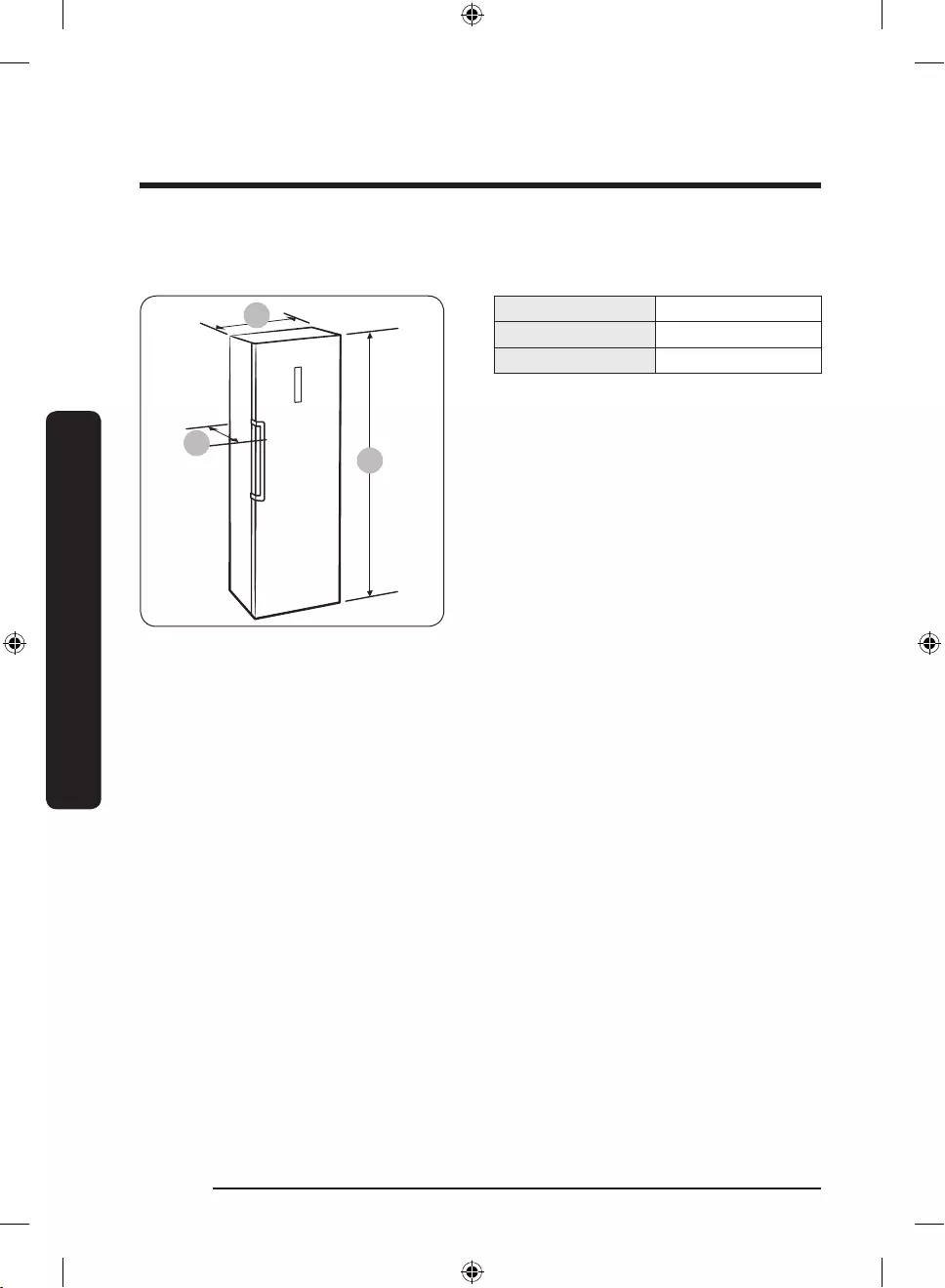
Installation
English26
Installation
Clearance
See the pictures and table below for space requirements for installation.
C
B
A
Depth “A” 694
Width “B” 595
Overall Height “C” 1853
(unit : mm)
Untitled-51 26 2017-03-09 5:07:42
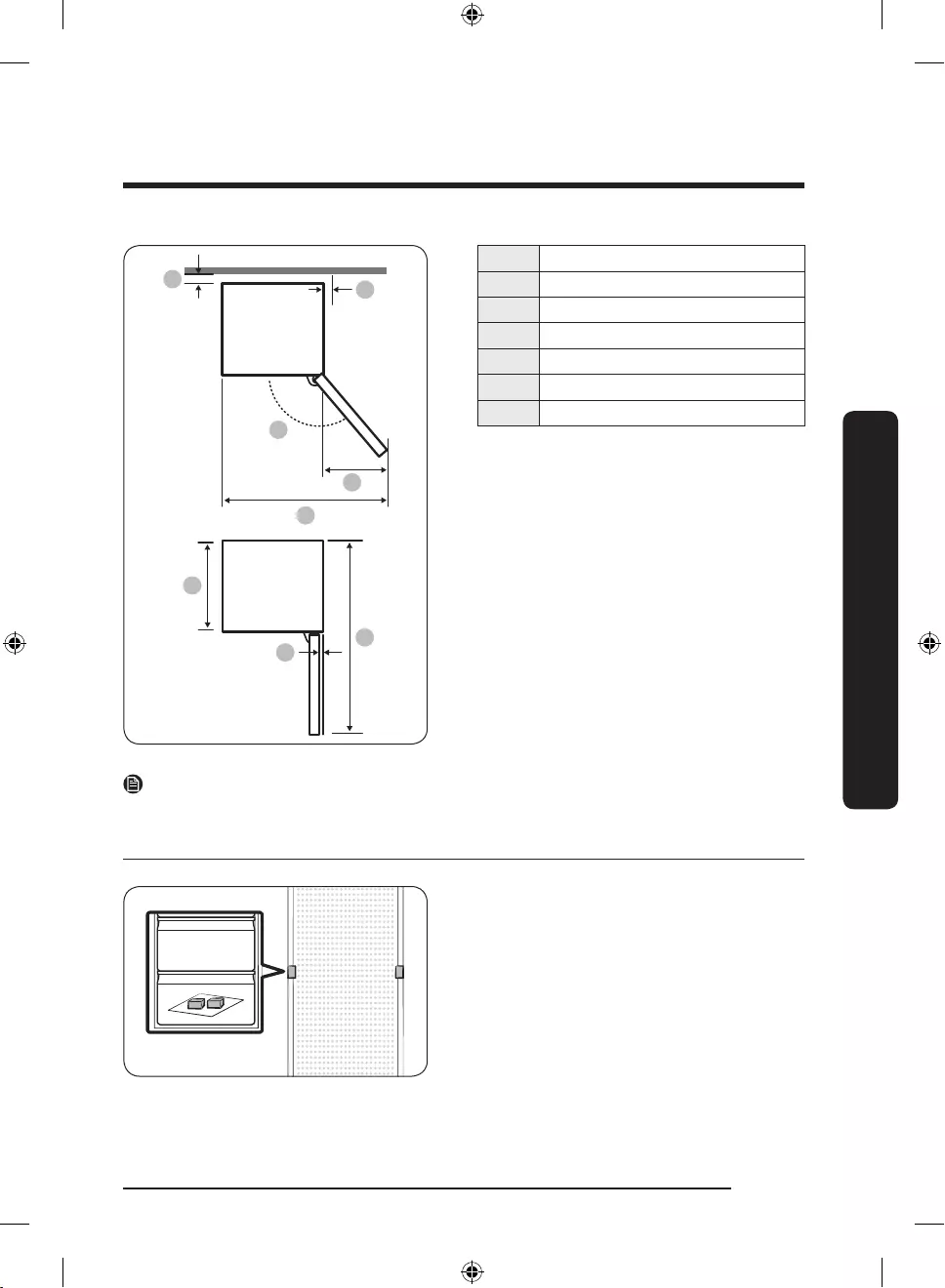
English 27
Installation
01
02
04
05
06
07
03
01
01 at least 50 mm
02 130°
03 377
04 967
05 575
06 5.5
07 1194
(unit : mm)
NOTE
The measurements in the above table may differ, depending on the measuring method.
STEP 2 Spacing (applicable models only)
1. Open the door and locate the provided
spacers (x2).
2. Unpack both spacers and attach them
to the rear of the refrigerator as shown.
They help ventilate air to the rear wall
and save power consumption.
Untitled-51 27 2017-03-09 5:07:43
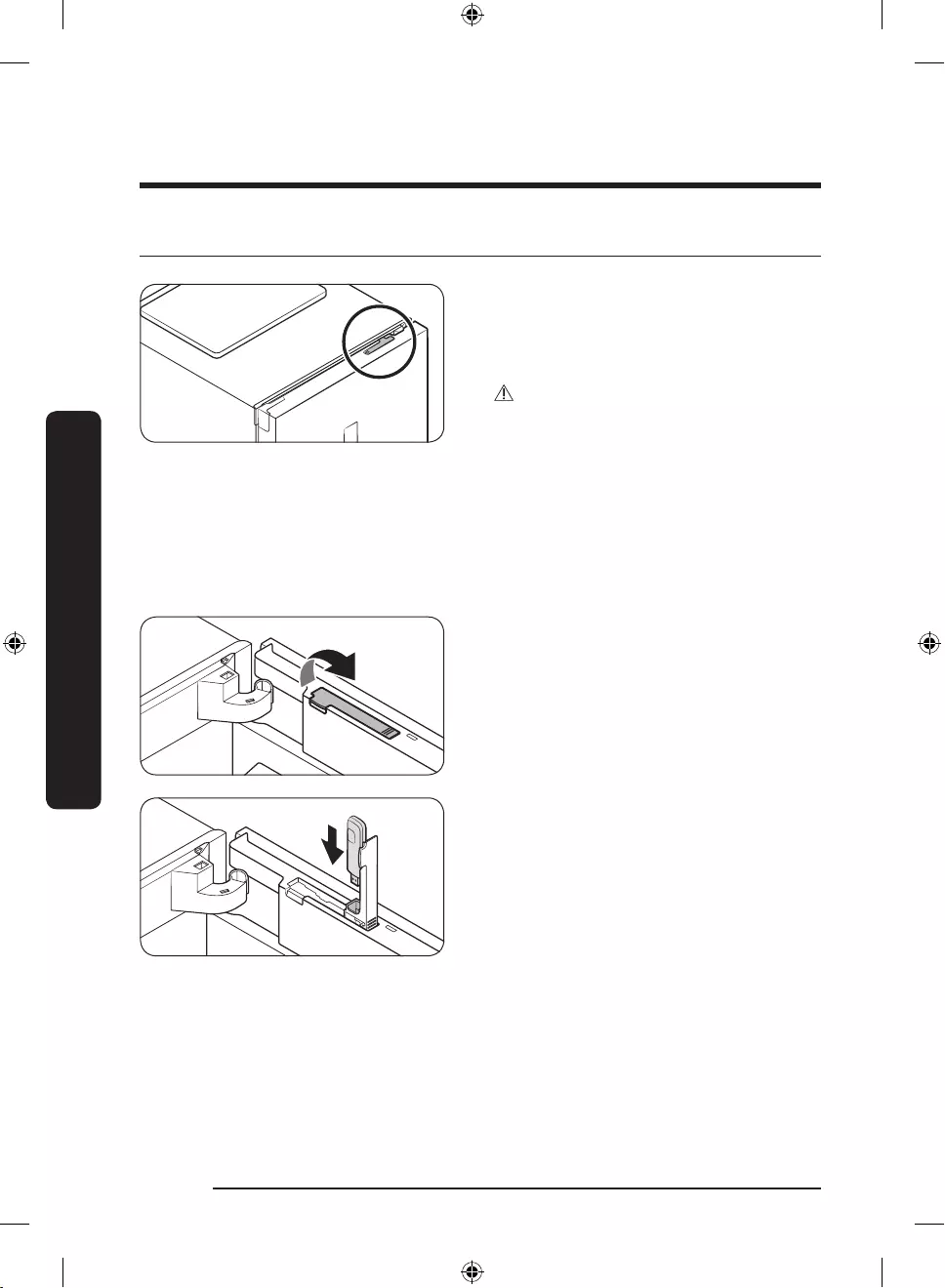
Installation
English28
Installation
STEP 3 WiFi connection
You can control the refrigerator remotely
using the Smart Home Dongle that is sold
separately. To purchase the Smart Home
Dongle, visit www.samsung.com and follow
the product information about the dongle.
CAUTION
• The Samsung Smart Home Dongle comes
in two types: one that is dedicated to
Samsung smart TVs, and the other one
that is dedicated to Samsung home
appliances.
• You must purchase the Samsung Smart
Home Dongle dedicated to home
appliances. Any other dongles may
cause system failure.
1. Open the freezer door, and pull up to
open the dongle cover at the top of the
door.
2. Insert the Smart Home Dongle into the
dongle port in the correct direction.
Untitled-51 28 2017-03-09 5:07:43
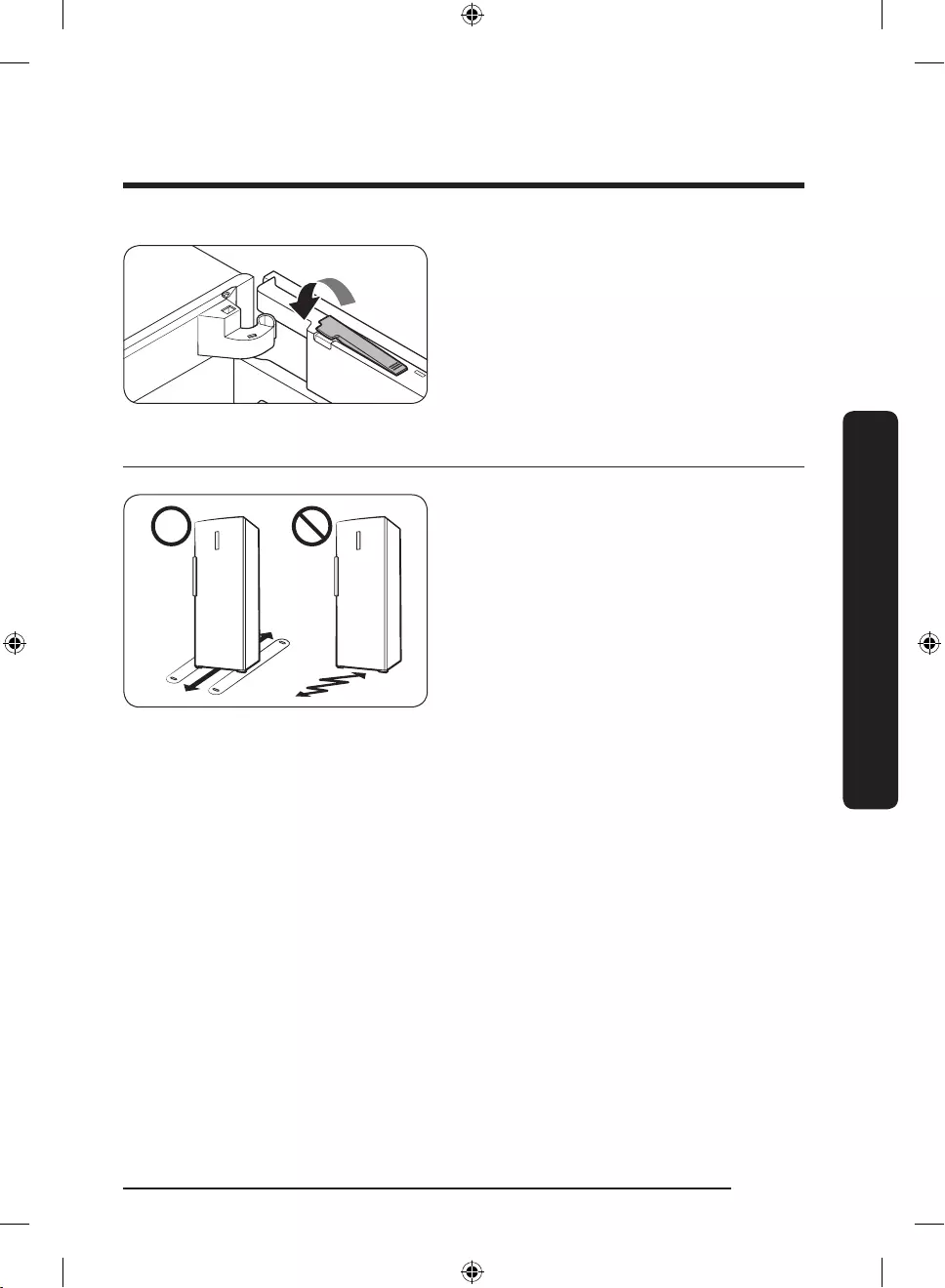
English 29
Installation
3. Push down to close the dongle cover.
STEP 4 Flooring
• The surface to install the refrigerator
must support a fully loaded refrigerator.
• To protect the oor, put a large piece
of cardboard on each foot of the
refrigerator.
• Once the refrigerator is in its nal
position, do not move it unless
necessary to protect the oor. If you
have to, use a thick paper or cloth such
as old carpet along the movement path.
Untitled-51 29 2017-03-09 5:07:43
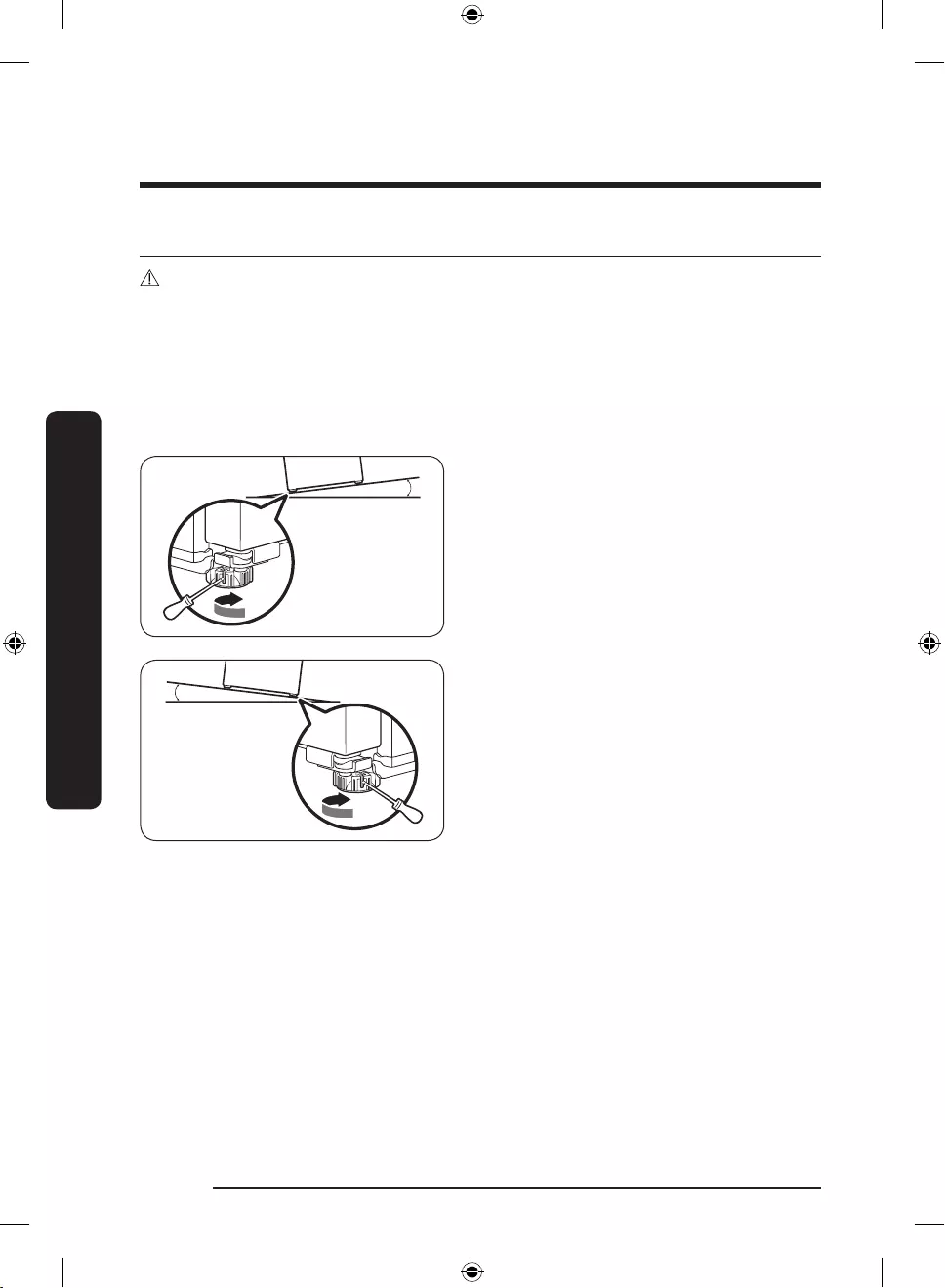
Installation
English30
Installation
STEP 5 Adjust the levelling legs
CAUTION
• The refrigerator must be levelled on a at, solid oor. Failing to do so can cause damage
to the refrigerator or physical injury.
• Levelling must be performed with an empty refrigerator. Make sure no food items
remain inside the refrigerator.
• For safety reasons, adjust the front side a little higher than the rear side.
The refrigerator can be levelled using the front legs that have a special screw (leveller) for
levelling purposes. Use a at-head screwdriver for levelling.
To adjust the height of the left side:
Insert a at-head screwdriver into the
leveller of the front left leg. Turn the
leveller clockwise to raise, or turn it
counter clockwise to lower.
To adjust the height of the right side:
Insert a at-head screwdriver into the
leveller of the front right leg. Turn the
leveller clockwise to raise, or turn it
counter clockwise to lower.
Untitled-51 30 2017-03-09 5:07:44
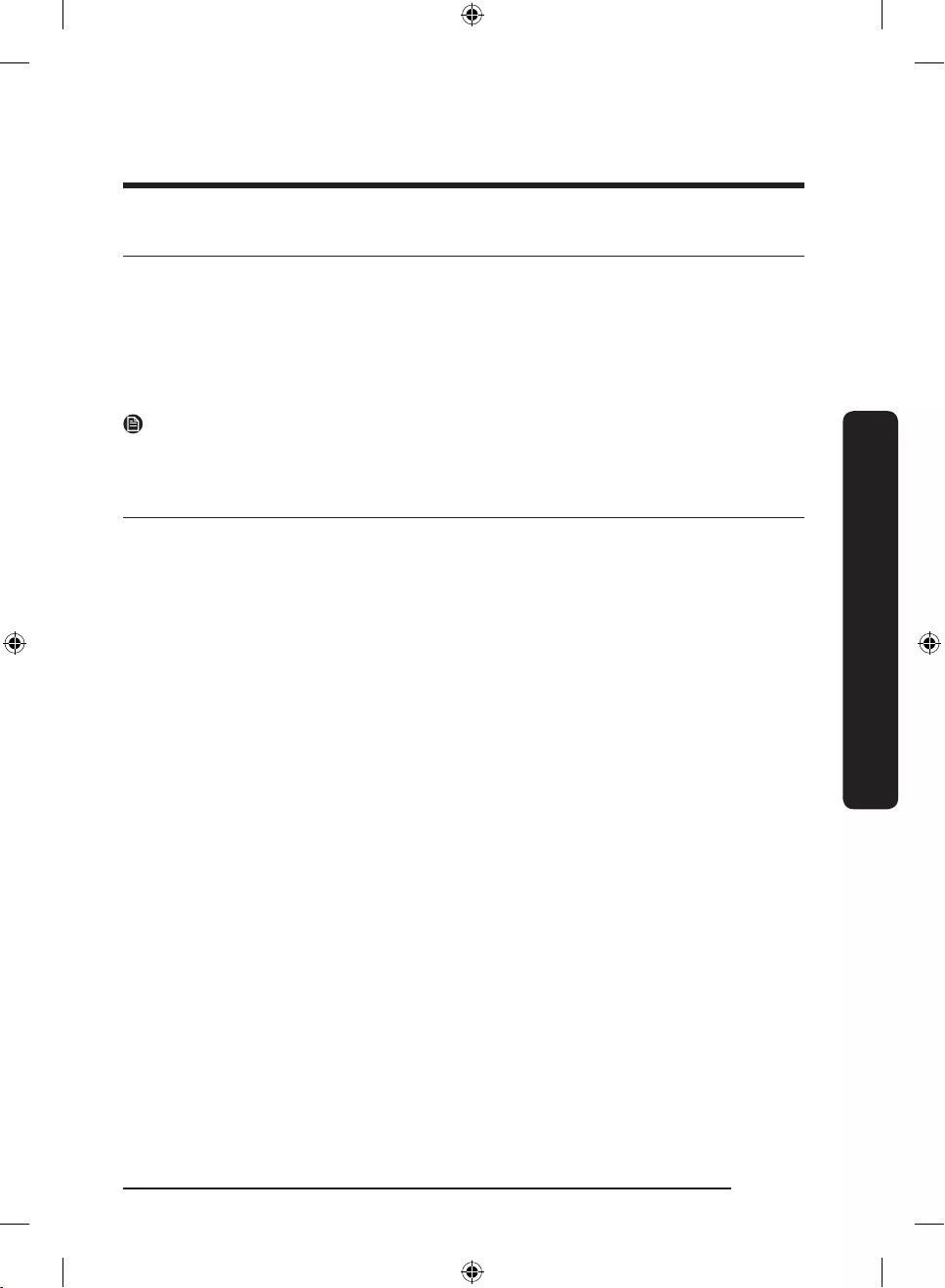
English 31
Installation
STEP 6 Initial settings
By completing the following steps, the refrigerator should be fully functioning.
1. Remove the PE foam sheet on each shelf corner, which is attached to protect the
refrigerator during transportation.
2. Plug the power cord into the wall socket to turn the refrigerator on .
3. Open the door, and check if the interior light lights up.
4. Set the temperature to the lowest, and wait until the refrigerator reaches the set
temperature. Now the refrigerator is ready for use.
NOTE
When the refrigerator powers on, the alarm will sound. To turn off the alarm, press
Freezer.
STEP 7 Final check
When installation is complete, conrm that:
• The refrigerator is plugged into an electrical outlet and grounded properly.
• The refrigerator is installed on a at, level surface with a reasonable clearance from the
wall or the cabinet.
• The refrigerator is level and is sitting rmly on the oor.
• The door opens and closes freely, and the interior light turns on automatically when you
open the door.
Untitled-51 31 2017-03-09 5:07:44
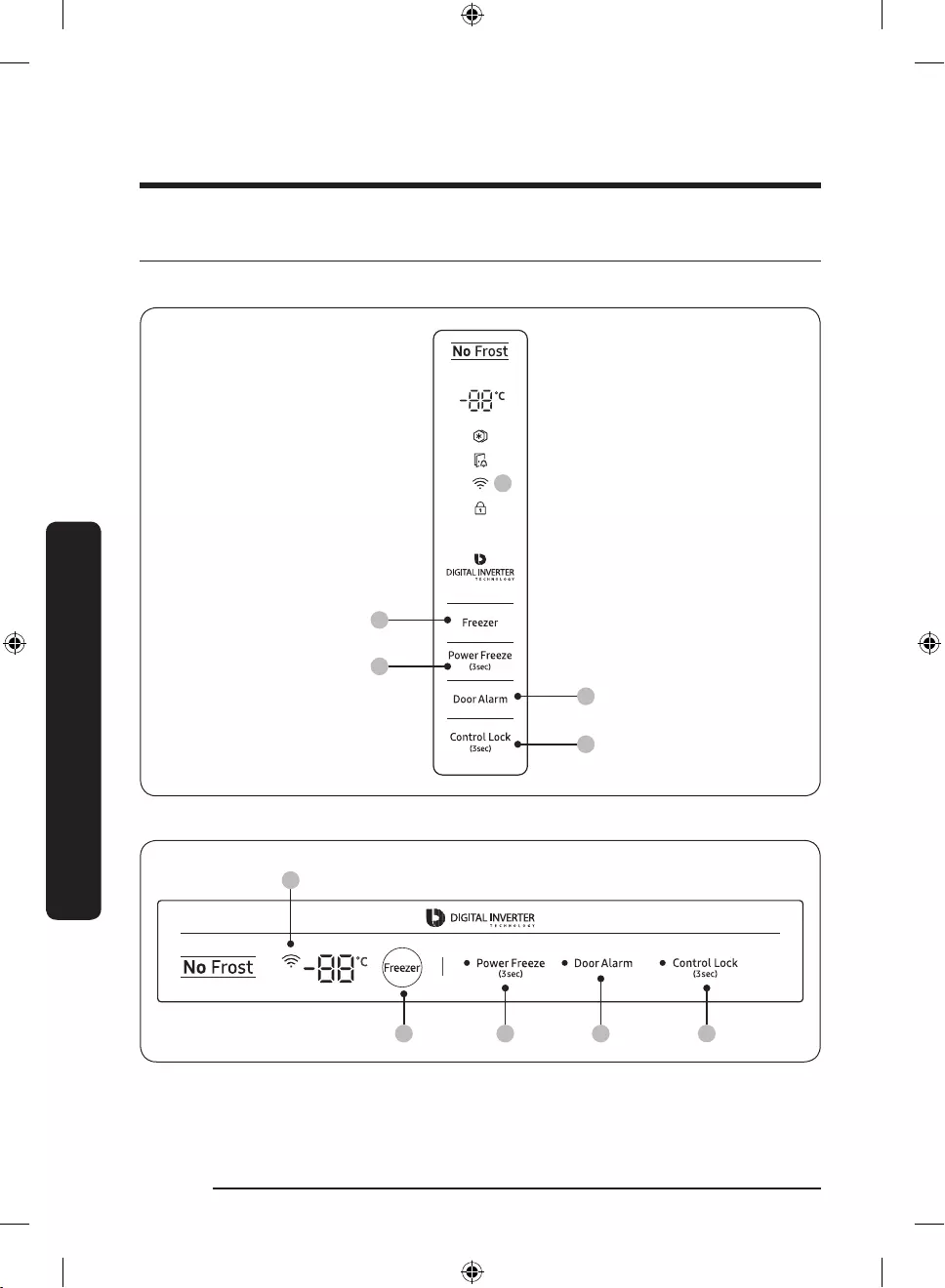
English32
Operations
Feature panel
TYPE A
01
03
05
02
04
TYPE B
01 02 03
05
04
Operations
Untitled-51 32 2017-03-09 5:07:44
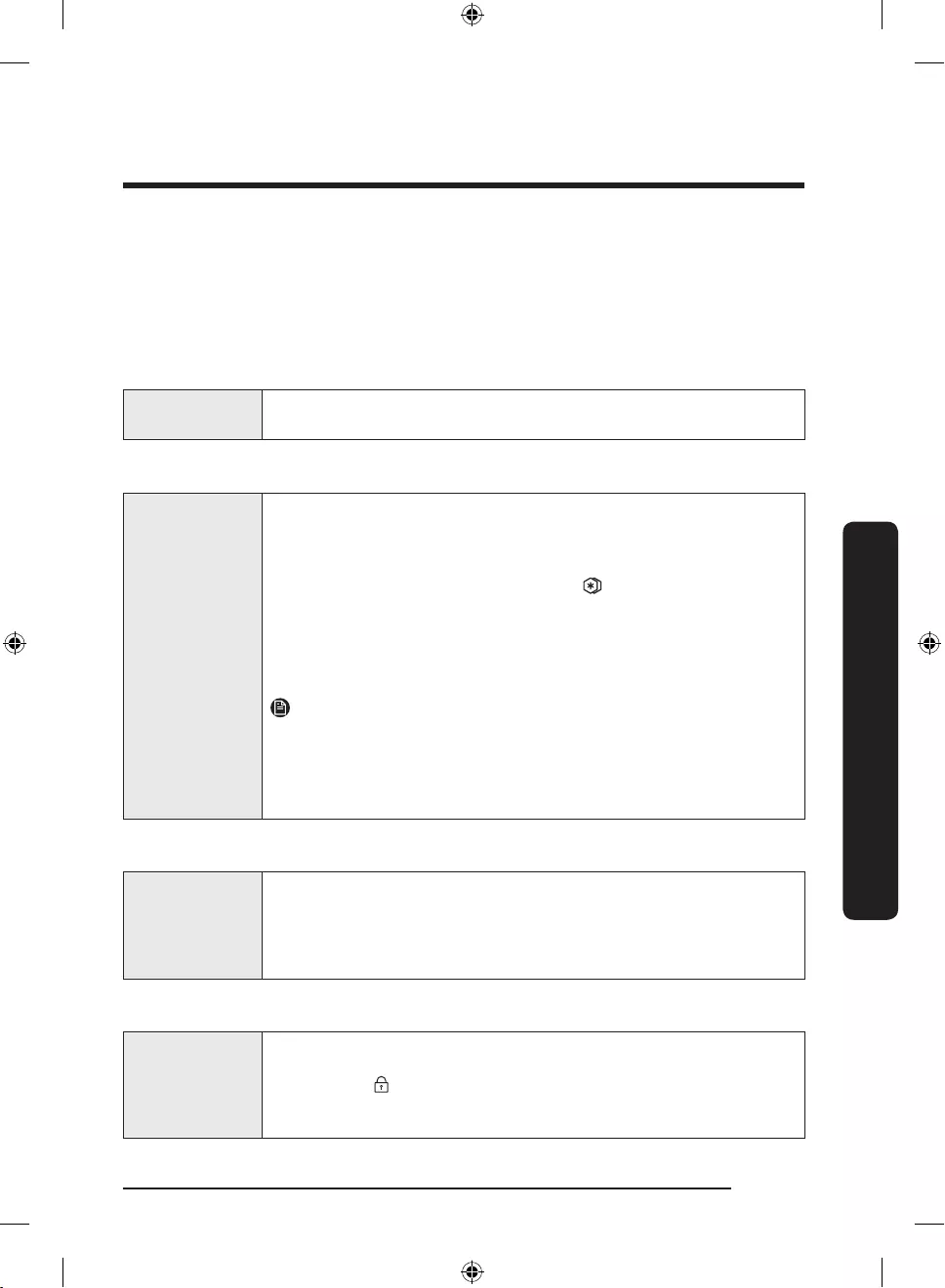
English 33
Operations
01 Freezer 02 Power Freeze
03 Door Alarm 04 Control Lock
05 Network connection
01 Freezer
Freezer The Freezer button can be used to set the freezer temperature.
Available temperatures are between -15 °C and -23 °C (default: -19 °C).
02 Power Freeze (3 sec)
Power Freeze
Power Freeze speeds up the freezing process at maximum fan speed.
The freezer keeps running at full speed for 50 hours and then returns
to the previous temperature.
• To activate Power Freeze, press and hold Power Freeze for 3
seconds. The corresponding indicator ( ) lights up, and the
refrigerator will speed up the freezing process for you.
• To deactivate, press and hold Power Freeze for 3 seconds again.
The freezer returns to the previous temperature setting.
• To freeze large amounts of food, activate Power Freeze for at least
20 hours before putting food in the freezer.
NOTE
• Using Power Freeze increases power consumption. Make sure you
turn it off and return to the previous temperature if you do not
intend to use it.
• To quickly freeze large quantities of food, remove the drawers and
use the provided shelf.
03 Door Alarm
Door Alarm
You can set the alarm for a reminder. If the door is left open for
more than 2 minutes, the alarm will sound with the Alarm indicator
blinking.
You can toggle to enable and disable the alarm by pressing Door
Alarm.
04 Control Lock (3 sec)
Control Lock
To prevent accidental manipulation, press and hold Control Lock for 3
seconds to activate the Control Lock. All controls will be disabled with
the indicator ( ) on.
To deactivate, press and hold again for 3 seconds. The controls will be
enabled as normal.
Untitled-51 33 2017-03-09 5:07:44

Operations
English34
Operations
05 Network connection
You can use the optional Smart Home Dongle (sold separately) to control and monitor your
refrigerator through the Samsung Smart Home app. For more information about Samsung
Smart Home, see the Samsung Smart Home section.
NOTE
• Recommended encryption systems include WPA/TKIP and WPA2/AES. Any newer or
unstandardized Wi-Fi authentication protocols are not supported.
• Wireless networks may be affected by the surrounding wireless communication
environment.
• If your Internet service provider has registered the MAC address of your PC or modem
for identication, your Samsung Smart Refrigerator may fail to connect to the Internet.
If this happens, contact your Internet service provider for technical assistance.
• The rewall settings of your network system may prevent your Samsung Smart
Refrigerator from accessing the Internet. Contact your Internet service provider for
technical assistance. If this symptom continues, contact a local Samsung service center
or retailer.
• To congure the wireless access point (AP) settings, see the user manual of the AP.
• Samsung Smart Refrigerators featuring the Samsung Smart Home Dongle support
both Wi-Fi 2.4 GHz with IEEE 802.11 b/g/n and Soft-AP protocols (IEEE 802.11 n is
recommended).
• Unauthorized Wi-Fi wireless routers may fail to connect to applicable Samsung Smart
Refrigerators.
Untitled-51 34 2017-03-09 5:07:44

English 35
Operations
Samsung Smart Home
Installation
Visit the Google Play Store, Galaxy Apps, or Apple App Store and search for “Samsung
Smart Home”. Download and install the Samsung Smart Home app provided by Samsung
Electronics to your smart device.
NOTE
• The Samsung Smart Home app is designed for Android 4.0 (ICS) or higher, or iOS 8.0 or
higher, and is optimized for Samsung smartphones (Galaxy S and Galaxy Note series).
On other smartphone models, some functions may operate differently.
• For improved performance, the Samsung Smart Home app is subject to change without
notice, or discontinued support according to the manufacturer’s policy.
Samsung account
You are required to register your Samsung account to use the app. If you don’t have a
Samsung account, follow the app’s onscreen instructions to create a free Samsung account.
Getting started
1. Insert the Smart Home Dongle into the corresponding port of your refrigerator.
2. Run the Samsung Smart Home app and log in with your Samsung account. iPhone users
are required to provide the login information each time they access the app.
3. Tap Add Device > Refrigerator.
4. Follow the onscreen instructions to provide the necessary information about the router,
and then tap Next.
5. Press and hold Freezer for more than 5 seconds until the "AP" message appears on the
display. Your refrigerator will be registered with the app.
6. When the device registration is complete, the refrigerator icon will appear on the
Samsung Smart Home app.
7. Tap the refrigerator icon to open the refrigerator page.
8. When a network connection is established, the Wi-Fi icon lights up on your refrigerator.
Refrigerator app
Integrated control
You can monitor and control your refrigerator at home as well as while on the move.
• Tap the refrigerator icon on the Samsung Smart Home to open the refrigerator page.
• Check the operation status or notication of your refrigerator, and change options or
settings if necessary.
NOTE
Some options or settings of the refrigerator may not be available for remote control.
Untitled-51 35 2017-03-09 5:07:44
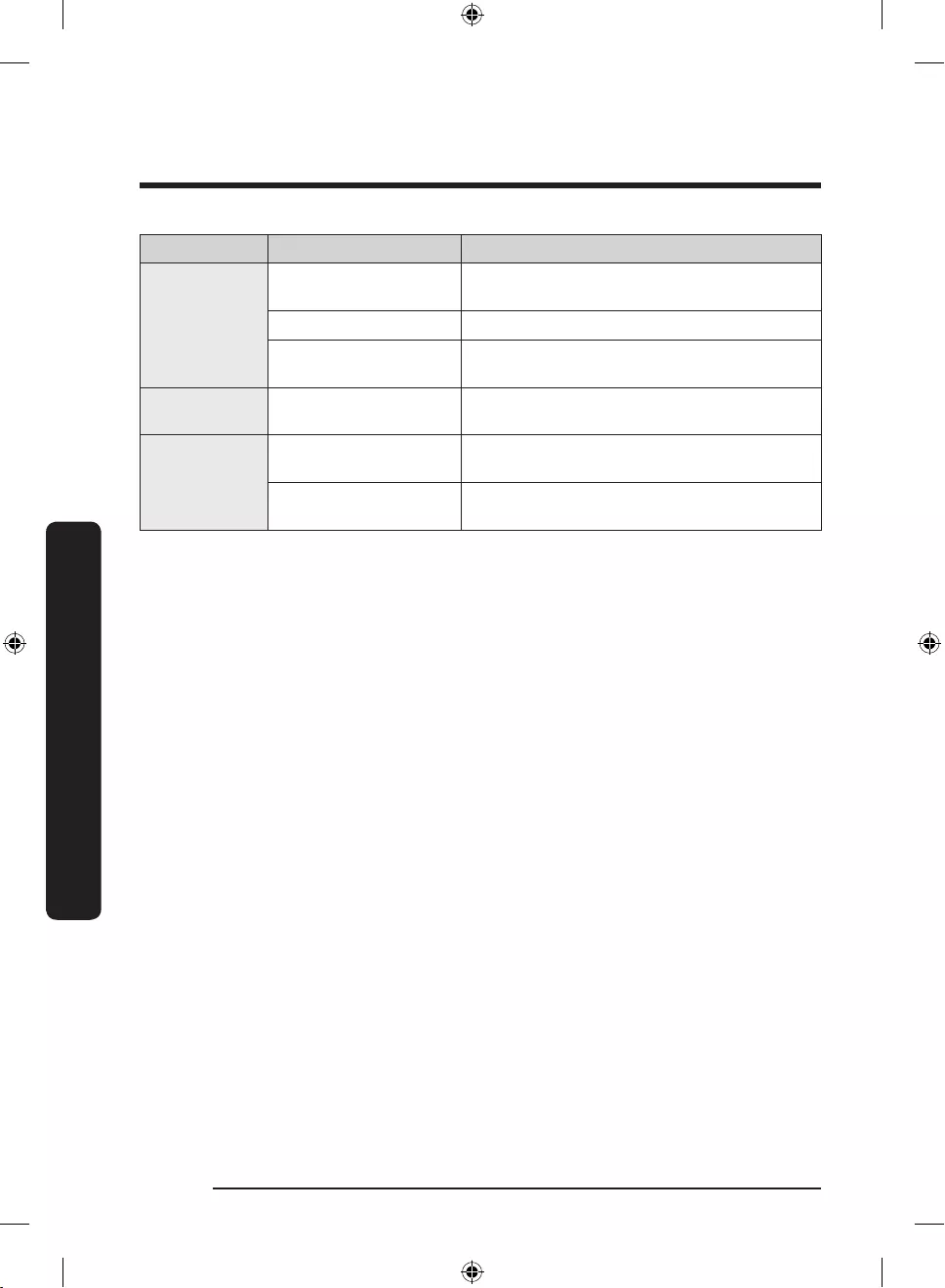
Operations
English36
Operations
Category Item Description
Monitoring
Freezer temperature Displays the current temperature setting of
the freezer.
Diagnosis Detects abnormal operations of the freezer.
Energy monitoring Checks the accumulated power consumption
of the freezer for the last 180 days.
Functions Power Freeze You can turn Power Freeze on or off, and
check the current settings.
Alarms
Abnormally high
temperature
This alarm is triggered when the freezer has
abnormally high temperatures.
Door opening This alarm is triggered if the freezer door is
open for a specic time.
Untitled-51 36 2017-03-09 5:07:44
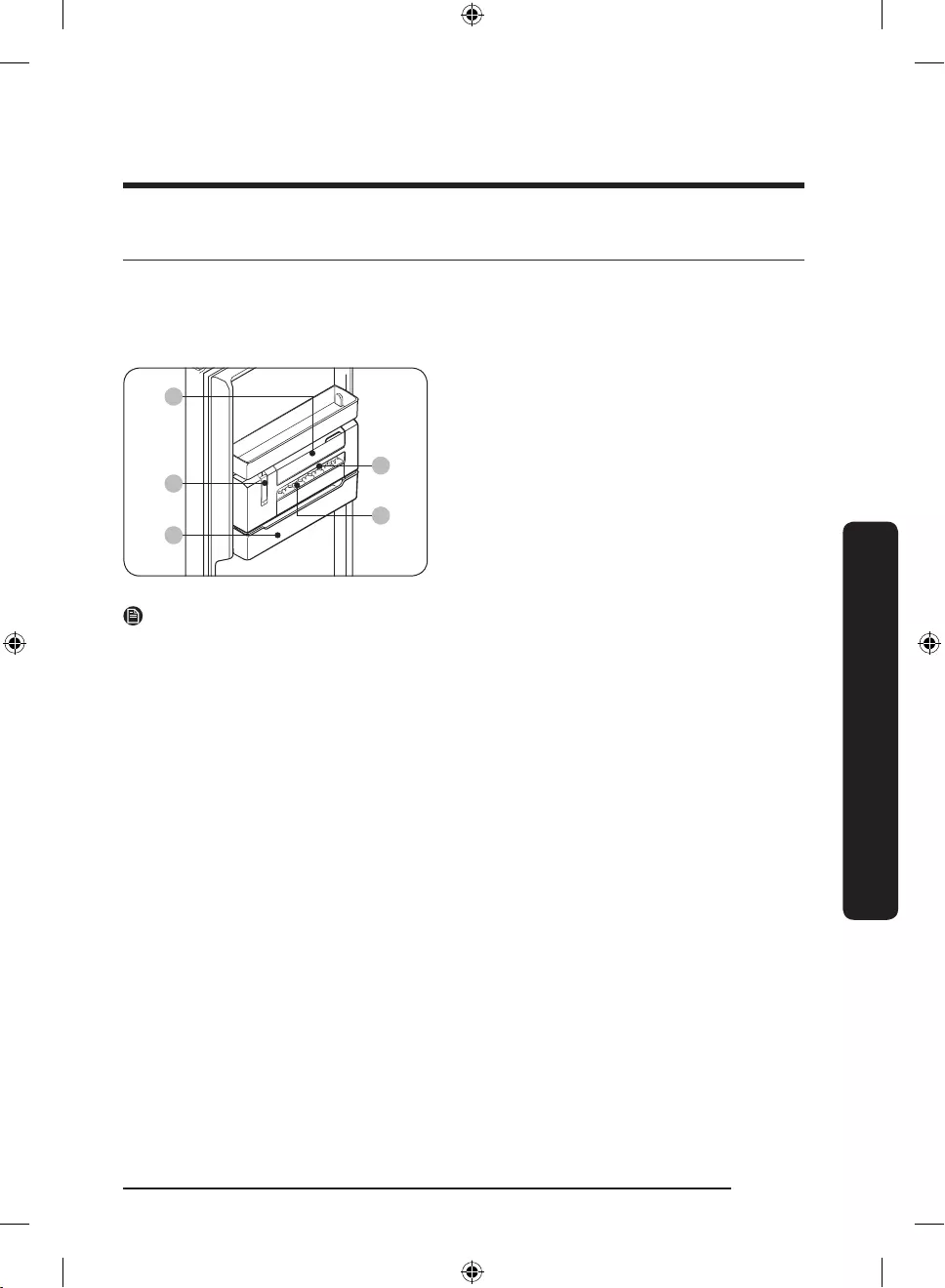
English 37
Operations
Special features
The actual image and special functions of your refrigerator may differ depending on the
model and the country.
Slim Ice Maker (applicable models only)
01
02
03
04
05
01 Water bin
02 Ice maker lever
03 Ice bucket
04 Ice template
05 Ice template cover
NOTE
If you do not intend to make ice, remove the Slim Ice Maker to secure more room for
storage. In this case, you can use the ice bucket (03) as a multipurpose storage bin.
Untitled-51 37 2017-03-09 5:07:44
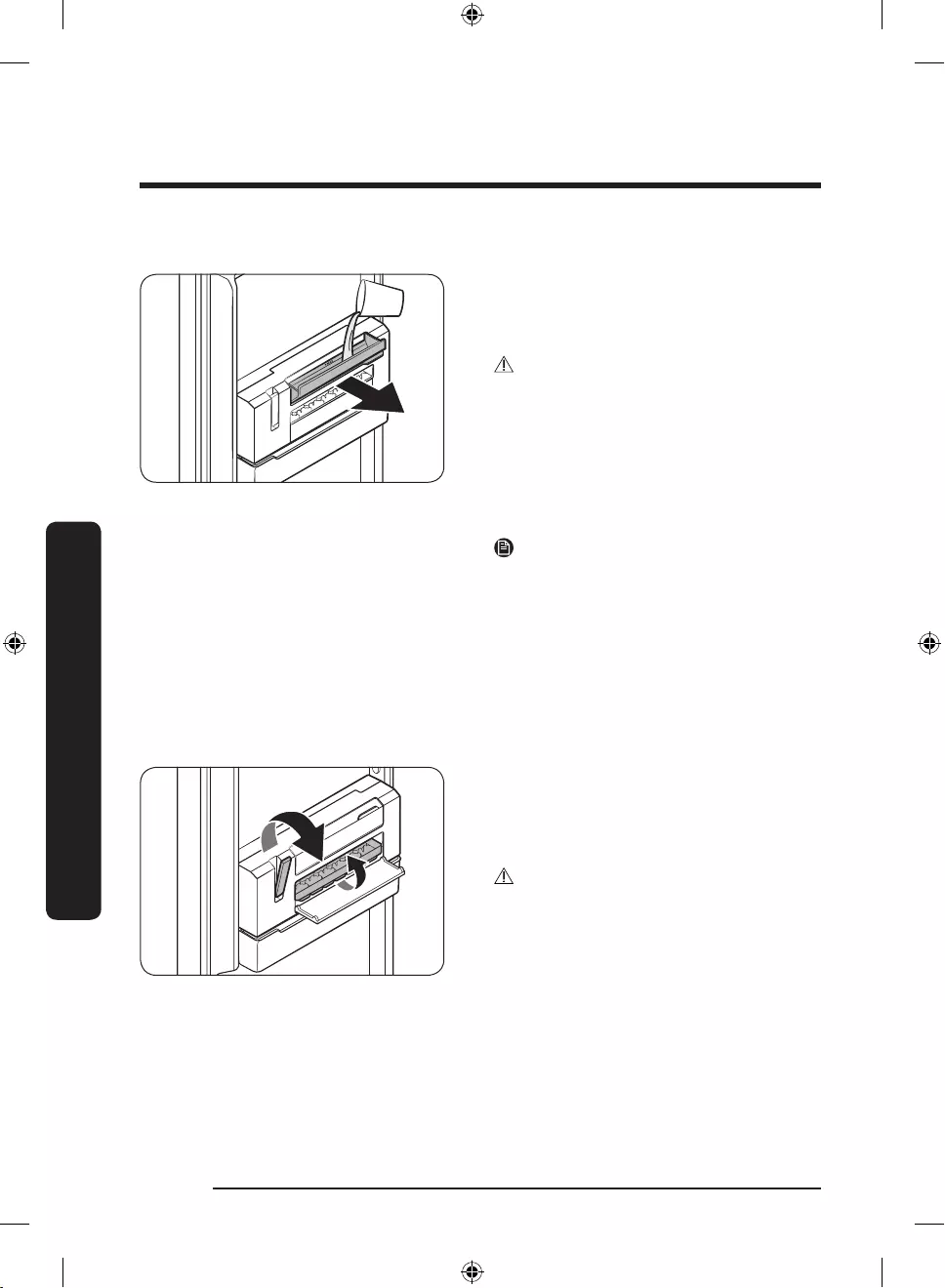
Operations
English38
Operations
To dispense ice manually
1. Pull up the handle of the water bin (01)
to open, and then ll the bin with water
up to the max line. Gently close the bin
so that water does not drop or leak.
CAUTION
• Do not exceed the max line. Excessive
water causes the ice to jam and not
dispense well.
• Use only potable water. Other liquids,
such as green tea or milk may not
dispense well.
• Gently close the water bin. Otherwise,
the water may drop or leak.
NOTE
• If you encounter a water leak, open the
water bin and check if the water bin’s
passage to the ice template is frozen. If
this is the case, pour lukewarm water
into the water bin up to the max line.
Let the passage melt.
• It is recommended to clean the water
bin’s passage to the ice template on a
regular basis because the passage is
likely to freeze.
2. Check if the ice freezes completely. Only
when the ice has frozen completely, pull
up the ice maker lever (02). Then, the ice
template (04) rotates and dispenses ice
to the ice bucket (03).
CAUTION
• Do not pull up the lever until the ice has
frozen completely. Half-frozen ice may
jam and damage the ice bucket.
Untitled-51 38 2017-03-09 5:07:45
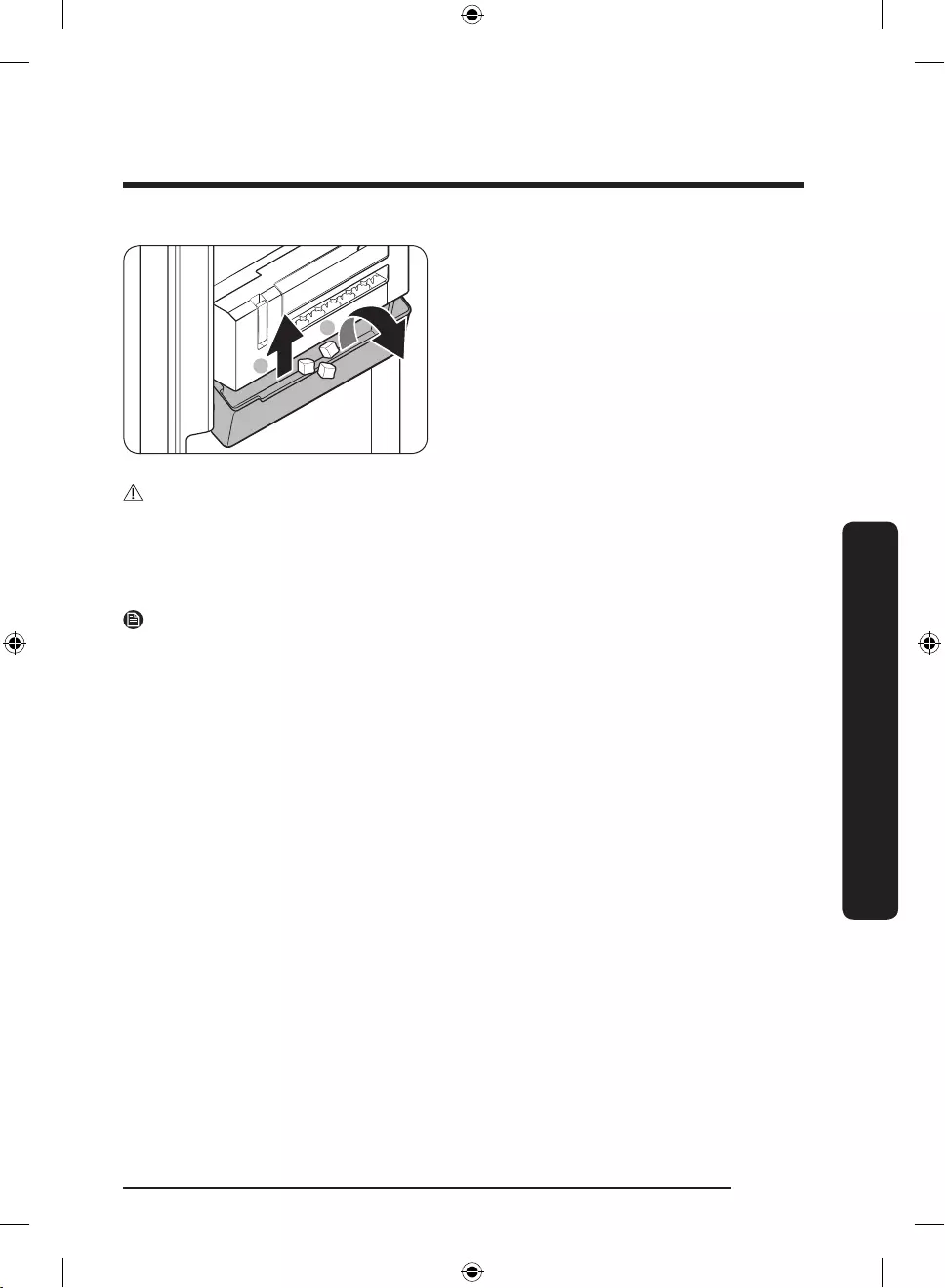
English 39
Operations
1
2
3. To dispense ice, slightly lift up the ice
bucket and tilt to the front.
CAUTION
• Do not tilt without lifting the ice bucket. The ice bucket may break.
• Do not pour water directly into the ice bucket for ice making. The ice bucket may break.
• Do not leave the freezer door open. The ice in the ice bucket melts and jams.
• In case of a power failure, make sure to empty the ice bucket before making ice.
• Use only potable water.
NOTE
• The ice cubes may not dispense at once, depending on the ice state. In this case, try
pulling the lever several times.
• If the ice does not dispense because an excessive amount of water was lled, remove
the ice template and empty. If this issue continues, uninstall the Slim Ice Maker unit and
empty.
Untitled-51 39 2017-03-09 5:07:45
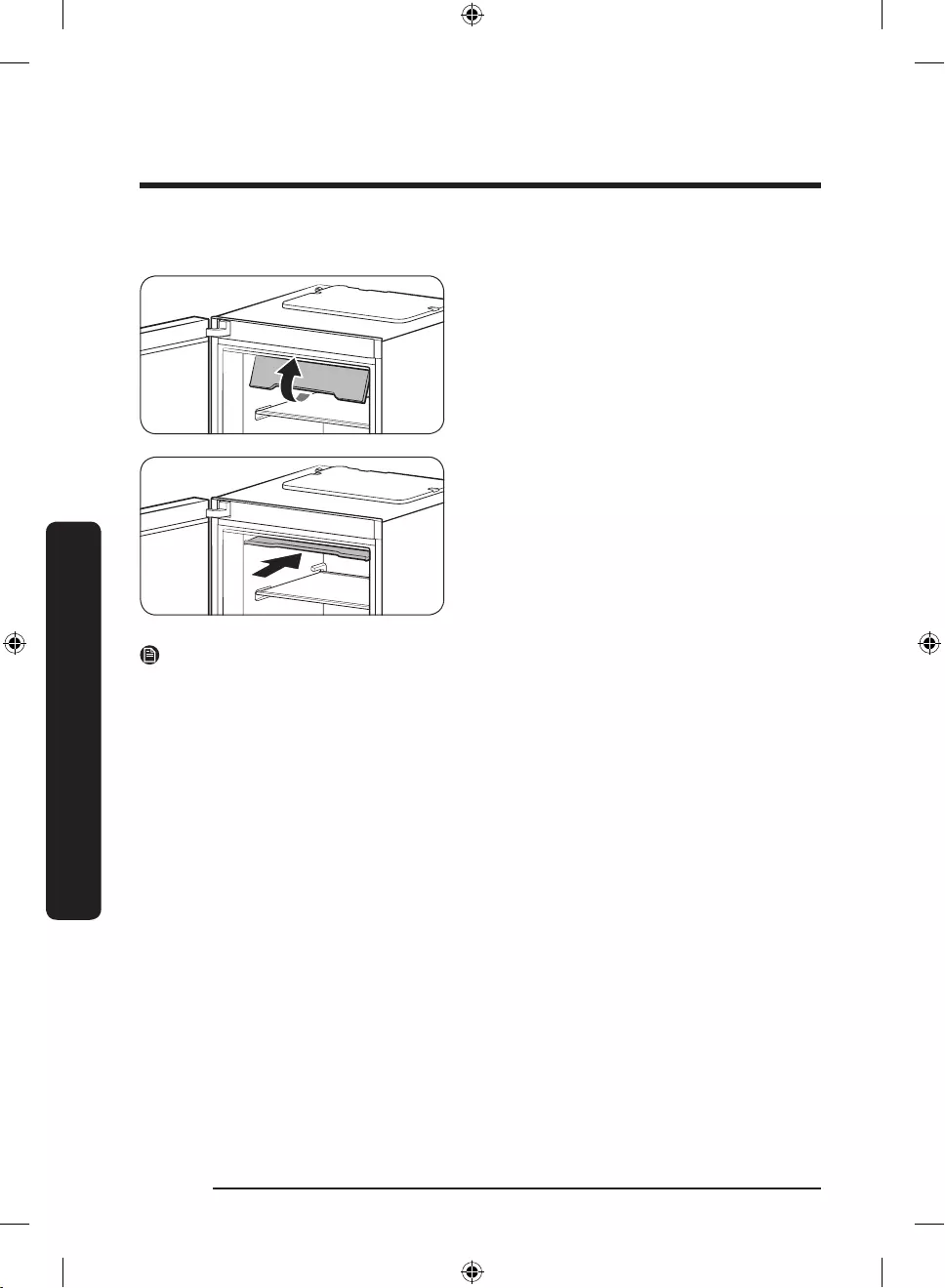
Operations
English40
Operations
To open the top shelf cover (applicable models only)
1. Fully pull up the front end of the top
shelf cover.
2. Then, push the cover inwards to the end.
NOTE
• To remove or put an item from the freezer, you must fold up the top shelf cover rst.
• The top shelf cover is removable. You can remove it if you do not intend to use it.
Untitled-51 40 2017-03-09 5:07:45
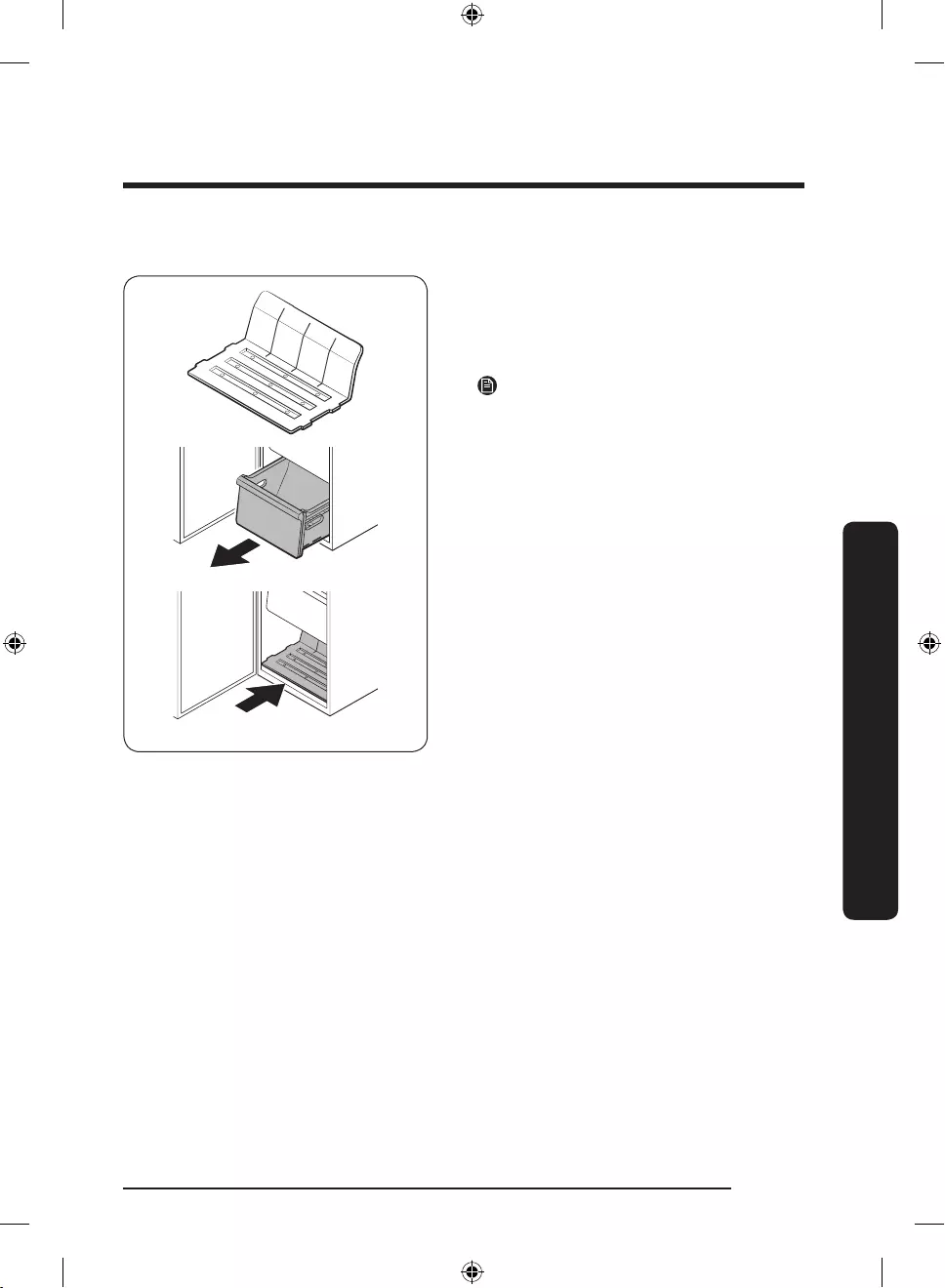
English 41
Operations
To secure more storage space (applicable models only)
If you need more storage space, remove
the top shelf cover and all 4 drawers and
insert the provided shelf (see the gure)
in the inner bottom of the main unit. Then,
remove the Slim Ice Maker.
NOTE
• Removal of the top shelf cover and the
drawers does not affect thermal and
mechanical characteristics of the freezer.
• A declared storage volume of the
freezer is based on the conditions where
the top shelf cover and all the drawers
are removed and the provided shelf is
inserted.
Untitled-51 41 2017-03-09 5:07:45
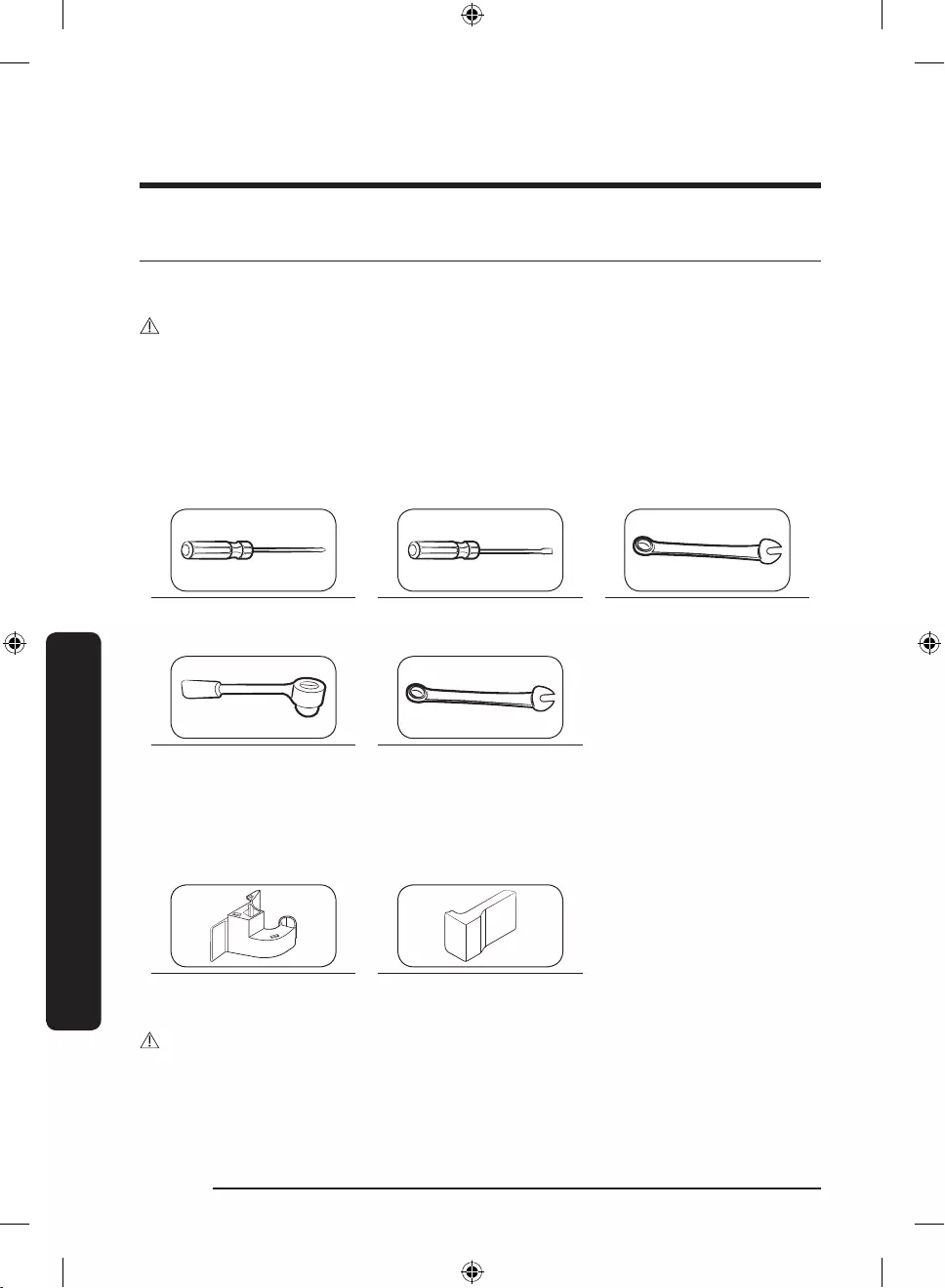
English42
Maintenance
Door reversal (applicable models only)
Reversing the door must be performed by Samsung-approved servicing personnel at your
own expense because this kind of servicing is not covered by the Warranty.
WARNING
• Reversing failure or property damage that may occur by unapproved agencies will not
be covered by the Warranty.
• Make sure that the refrigerator is disconnected from the power source before doing the
reversal.
• You must wait for at least an hour after door reversing is complete. This is to prevent
electric shock that could occur.
Tools required (not provided)
Phillips screwdriver Flat-head screwdriver 10 mm spanner
(for top hinge shaft)
8 mm socket wrench
(for bolts)
12 mm spanner
(for bottom hinge shaft)
Accessories
The appearance of the accessories listed below may differ with the model.
Hinge cover (L) Space cover (L)
CAUTION
Throughout the entire reversing procedure, keep all the small parts (screws, caps, etc.) of
the refrigerator away from children or infants for safety reasons.
Maintenance
Untitled-51 42 2017-03-09 5:07:46
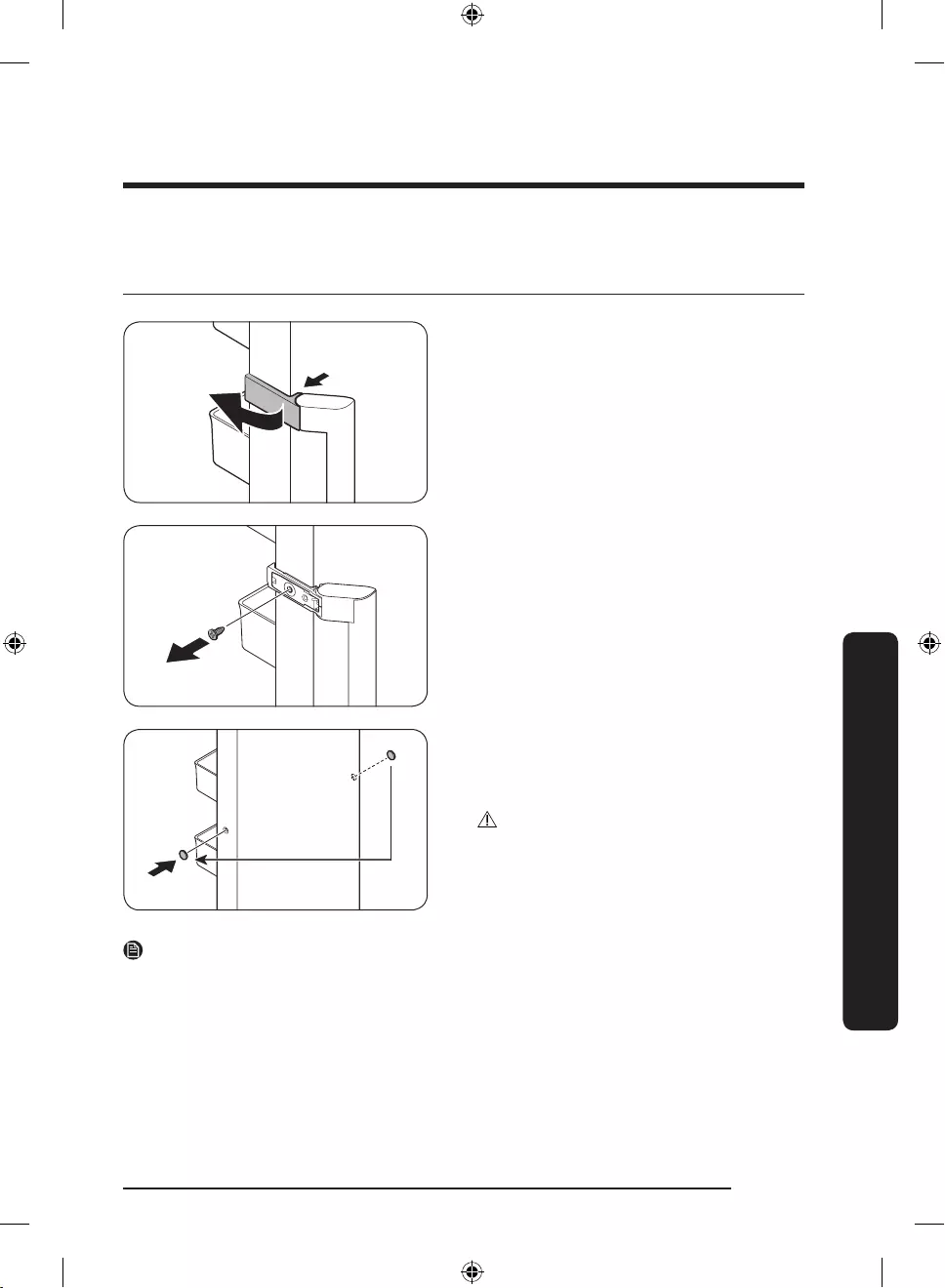
English 43
Maintenance
Step-by-step instructions
STEP 1 Remove the handle
1. Unlock the handle cap and put it aside.
2. Remove each screw on the upper and
lower side of the handle.
3. Use a at-head screwdriver to remove
the handle screw caps (x2). Then, insert
the handle screw caps in the opposite
side.
CAUTION
To prevent physical damage, use caution
when removing the handle screw caps.
NOTE
Keep the handle safe for later use.
Untitled-51 43 2017-03-09 5:07:46
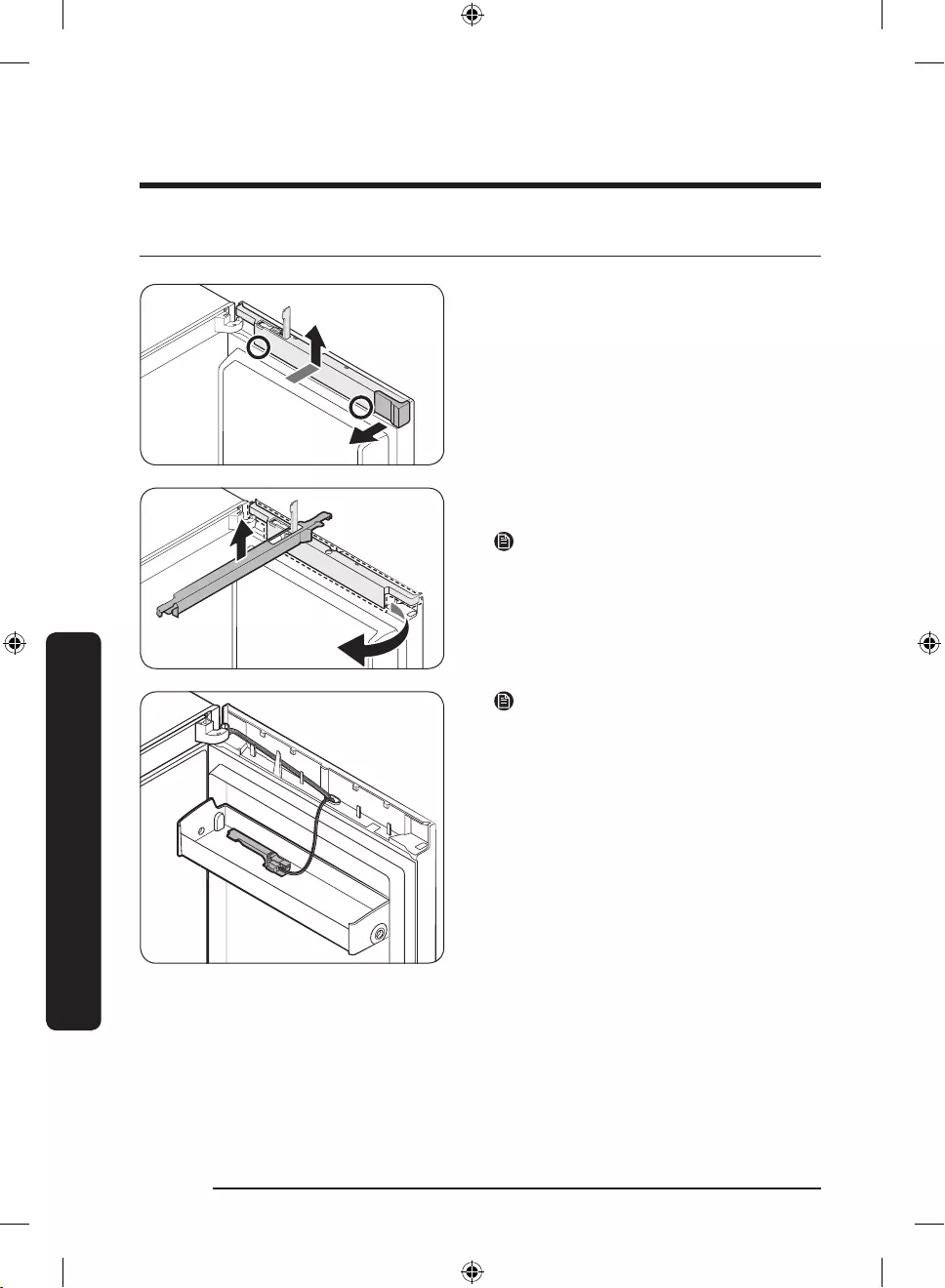
Maintenance
English44
Maintenance
STEP 2 Remove the freezer door
1. Open the dongle cover, and remove the
space cover.
2. While holding down the lower areas
(marked in the gure) of the wire cover
with both hands, lift up the wire cover.
3. Turn the wire cover to the front by 90
degrees, and then push up to remove.
NOTE
Keep both the space cover and the wire
cover in a safe place. They are necessary
when you return the door to the initial
position (before reversing the door).
NOTE
Put the dongle cover on the door guard for
later use.
Untitled-51 44 2017-03-09 5:07:46
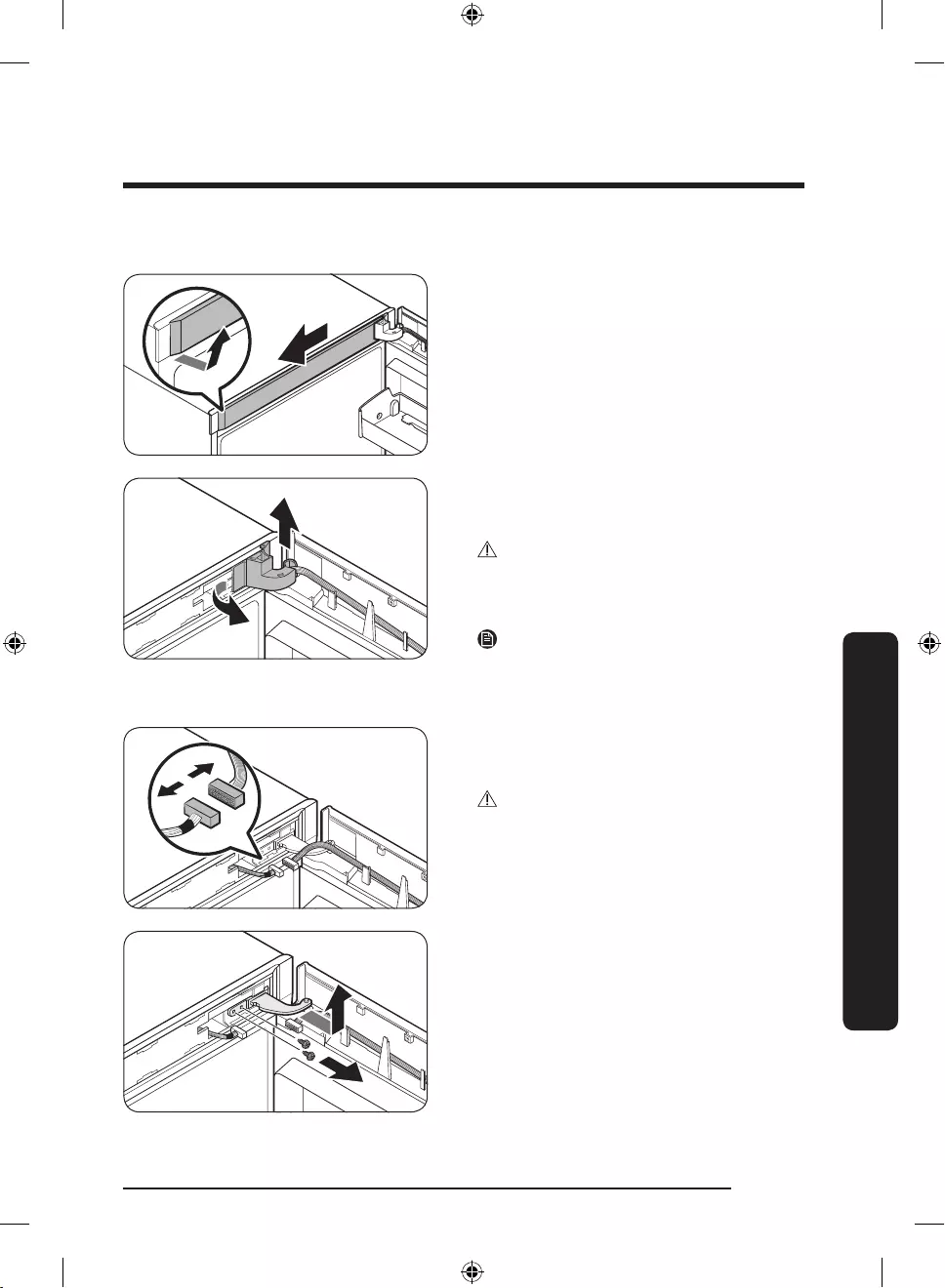
English 45
Maintenance
Display Type A
1. Remove the top frame cover from the
right side rst. Then, pull out to the
front.
2. Pull out the left side of the hinge cover
to remove, and then slightly lift up the
bottom to pull out.
CAUTION
When removing the hinge cover, use
caution not to damage the connectors and
wires on or around the freezer door.
NOTE
Keep the hinge cover in a safe place. It is
necessary when you return the door to the
initial position (before reversing the door).
3. Disconnect the connectors on or around
the freezer door. Loosen the screws
from the top hinge to remove.
CAUTION
To prevent the freezer door from falling,
make sure to hold the freezer door tight
while removing the top hinge.
Untitled-51 45 2017-03-09 5:07:47
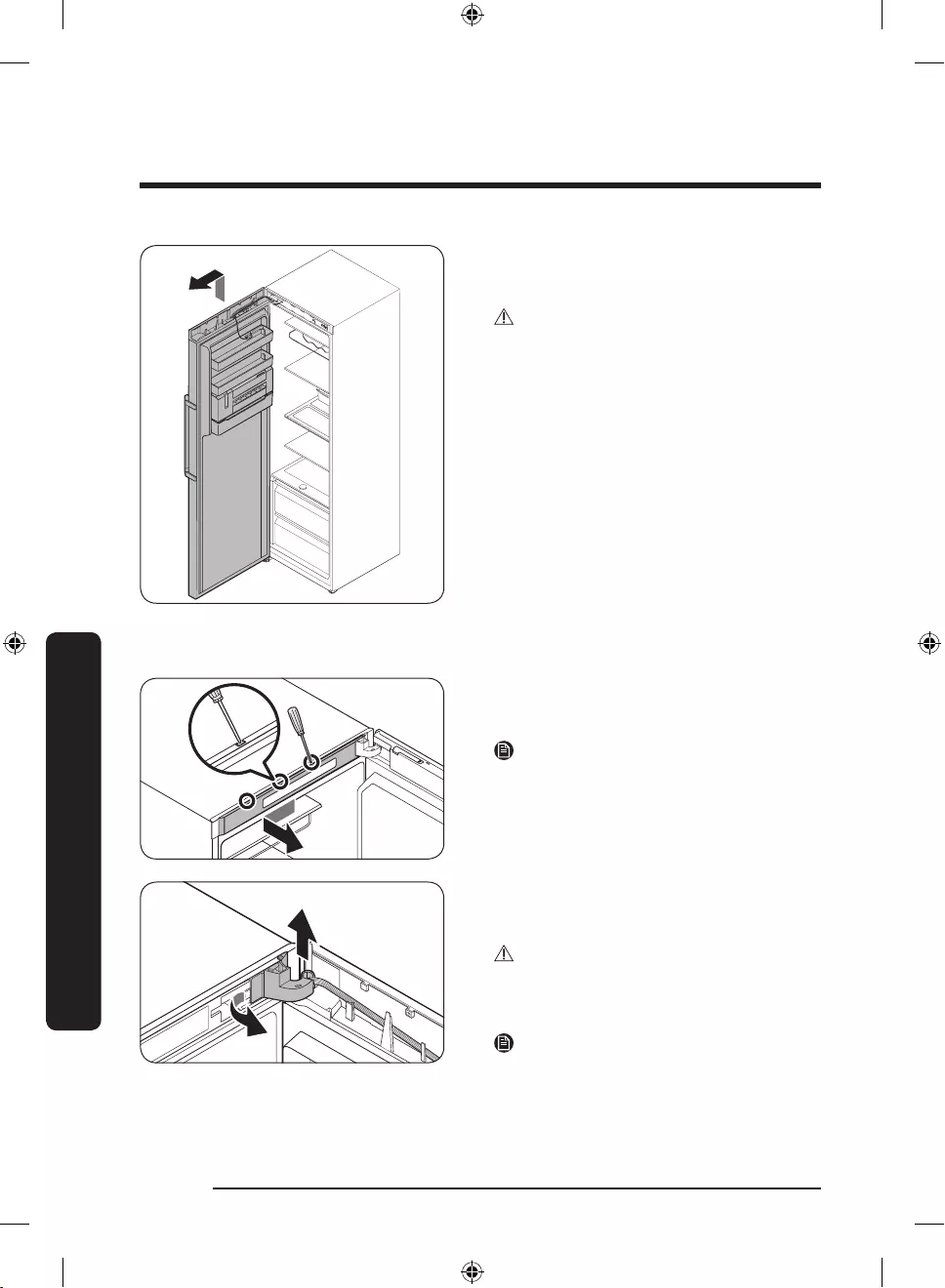
Maintenance
English46
Maintenance
4. When the top hinge is removed, lift up
to remove the freezer door. Keep the
door in a safe place.
CAUTION
The door is heavy. To prevent damage or
injury, use caution while removing the
door.
Display Type B
1. Use a at-head screwdriver to insert in
the holes one after another on the top of
the door to remove the top frame cover.
NOTE
Start with the hole farthest from the hinge.
2. Pull out the left side of the hinge cover
to remove, and then slightly lift up the
bottom to pull out.
CAUTION
When removing the hinge cover, use
caution not to damage the connectors and
wires on or around the freezer door.
NOTE
Keep the hinge cover in a safe place. It is
necessary when you return the door to the
initial position (before reversing the door).
Untitled-51 46 2017-03-09 5:07:48
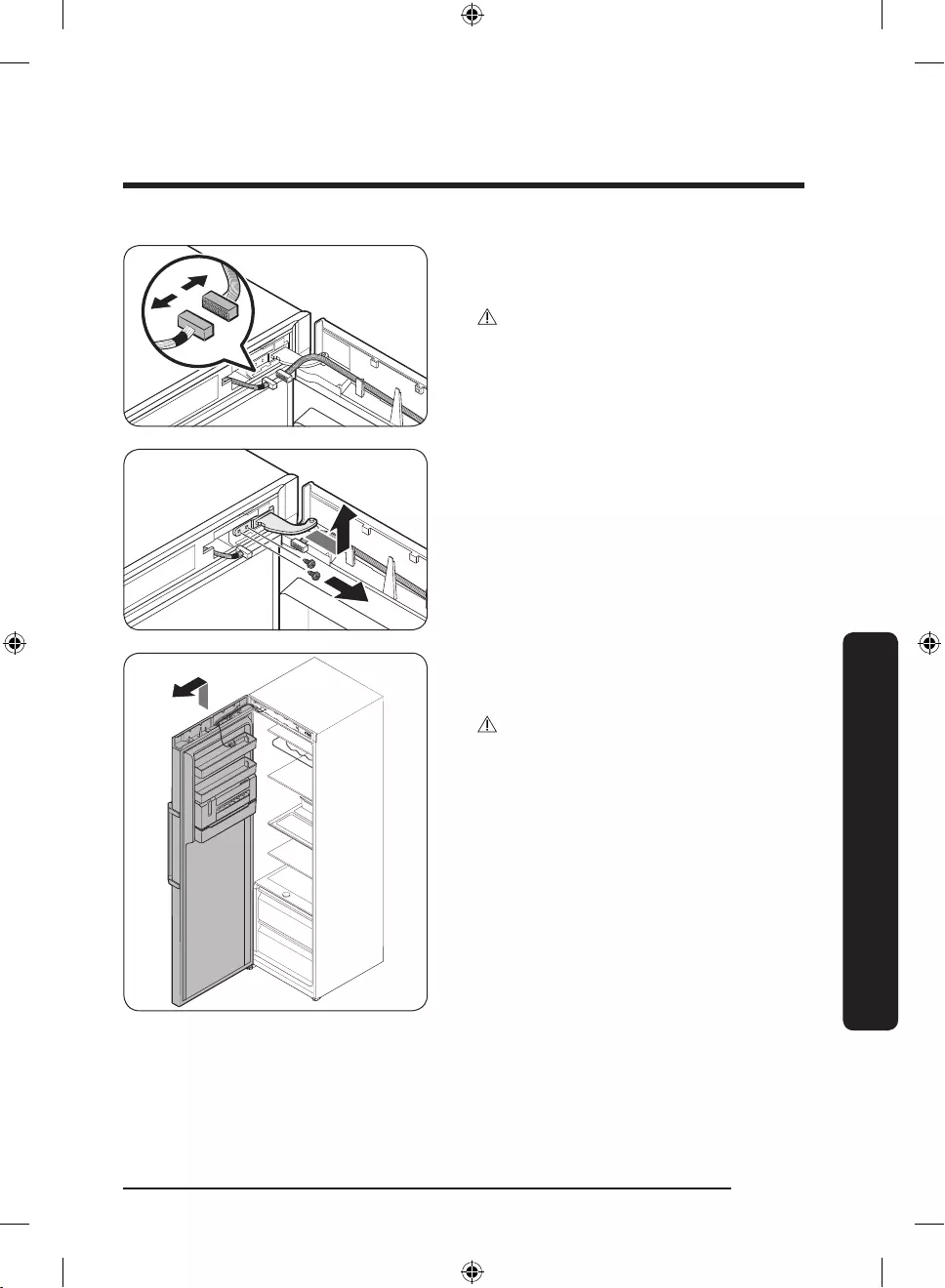
English 47
Maintenance
3. Disconnect the connectors on or around
the freezer door. Loosen the screws
from the top hinge to remove.
CAUTION
To prevent the freezer door from falling,
make sure to hold the freezer door tight
while removing the top hinge.
4. When the top hinge is removed, lift up
to remove the freezer door. Keep the
door in a safe place.
CAUTION
The door is heavy. To prevent damage or
injury, use caution while removing the
door.
Untitled-51 47 2017-03-09 5:07:48
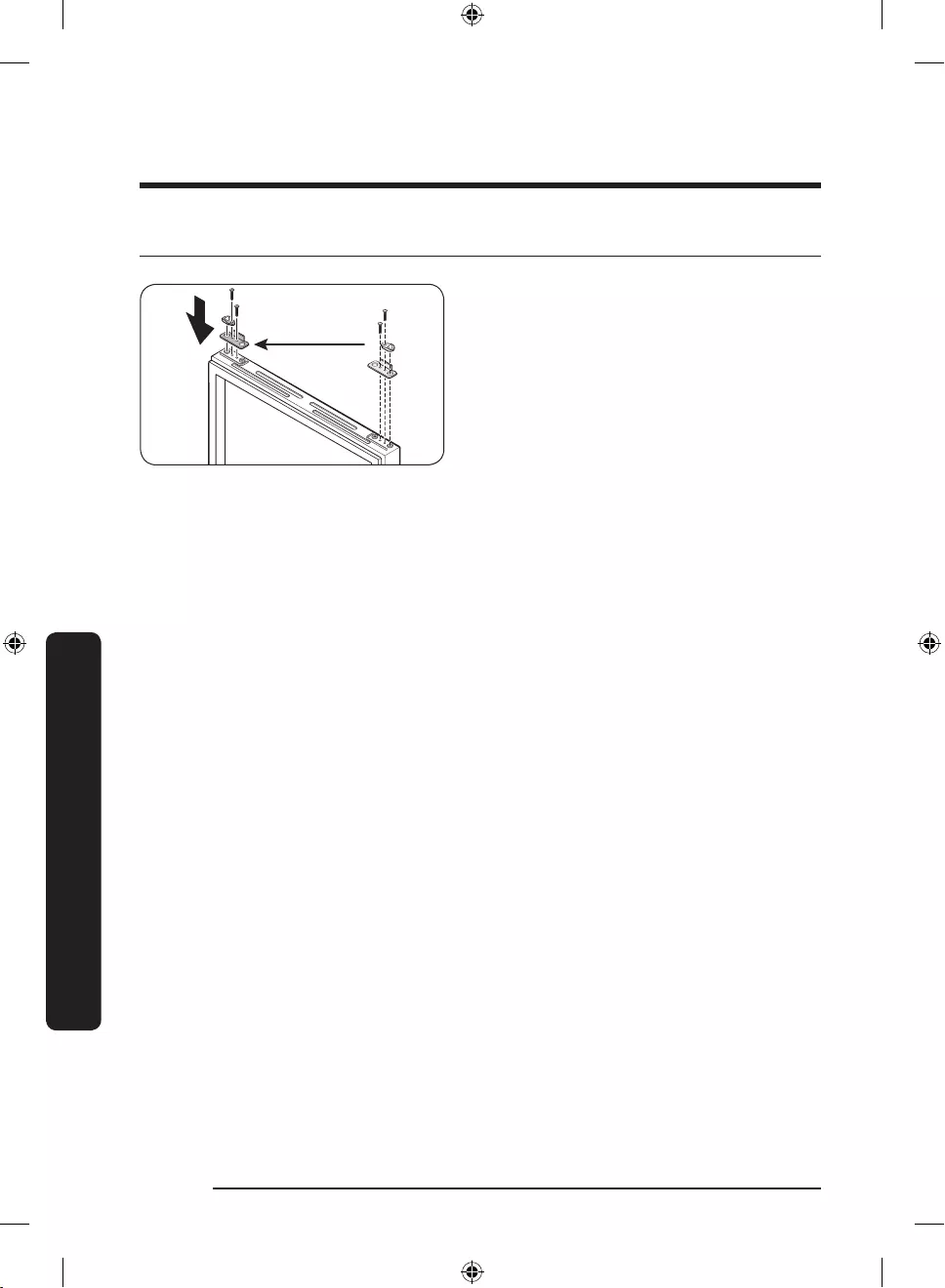
Maintenance
English48
Maintenance
STEP 3 Reverse the auto closer
1. From the freezer door, remove the auto
closer lever by loosening the screws on
the lever and the screws in the opposite
side.
2. Insert the auto closer lever in the
opposite side, and tighten the screws.
Untitled-51 48 2017-03-09 5:07:48
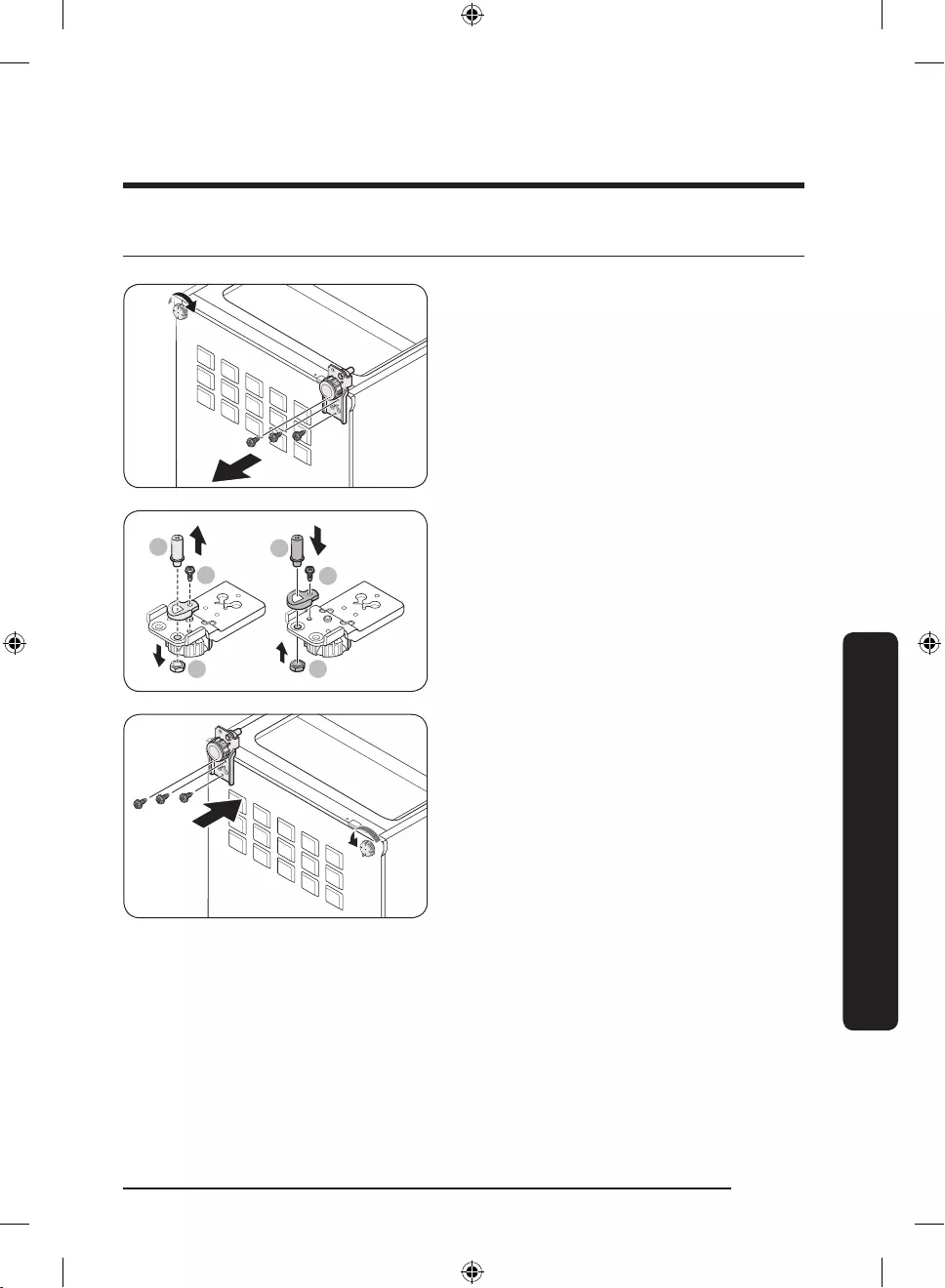
English 49
Maintenance
STEP 4 Reverse the bottom hinge
1. Lay down the refrigerator with care.
Then, remove the screws from the
bottom hinge on the right side and
the levelling leg on the left side,
respectively.
1
1
2
4
5
6
2. Use an 8 mm socket wrench to remove
the rear bolt next to the shaft.
3. Remove the shaft bolt beneath the
bottom hinge.
4. Use a Phillips screwdriver to remove the
shaft.
5. Insert the shaft in the opposite side.
6. Reinsert and tighten the rear bolt.
7. Reinsert and tighten the shaft bolt.
8. Insert the bottom hinge in the opposite
side and tighten with screws. Mount the
levelling leg in the opposite side and
tighten with screws.
9. Stand the refrigerator with care.
Untitled-51 49 2017-03-09 5:07:48
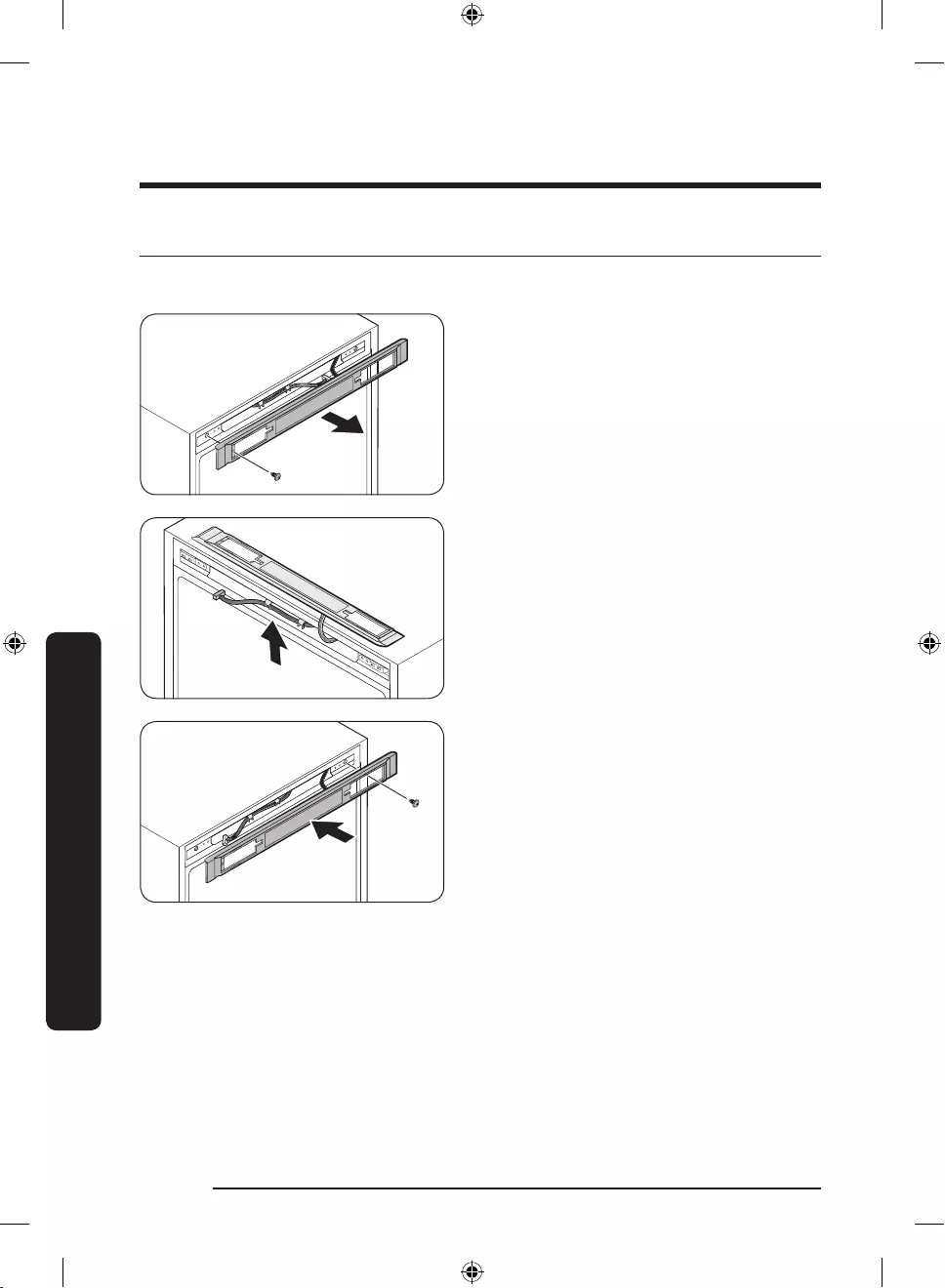
Maintenance
English50
Maintenance
STEP 5 Reattach the freezer door
Display Type A
1. Remove the screw and pull out the
control cover.
2. Move the connectors and wires to the
opposite side. Insert the control cover,
and then tighten the screws on the
opposite side.
Untitled-51 50 2017-03-09 5:07:49
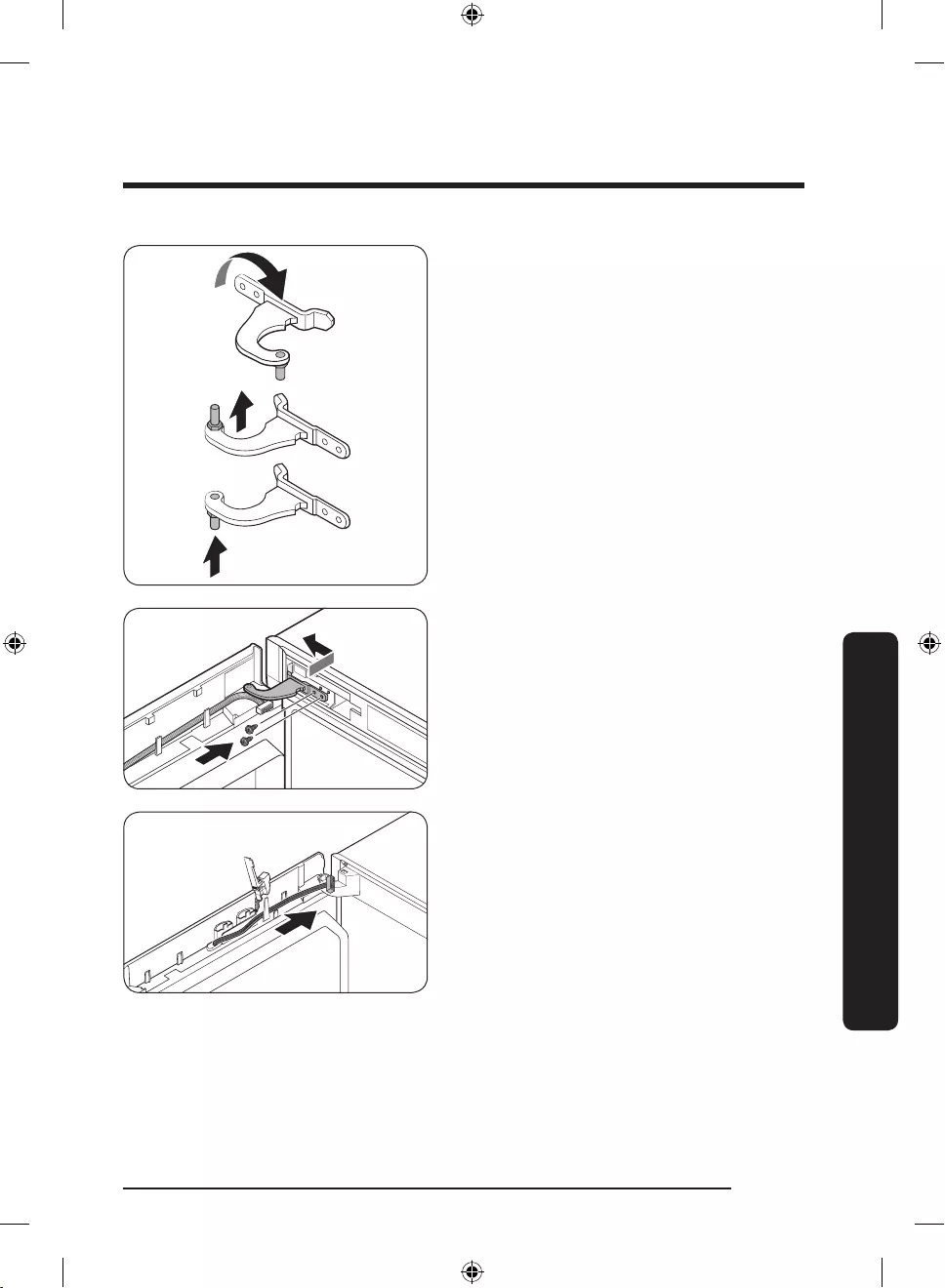
English 51
Maintenance
3. Remove the shaft from the top hinge.
Then, reassemble the shaft as shown.
4. Insert the bottom of the door rst into
the main unit.
5. Insert the top hinge and tighten it with
screws.
• Move the wires to the opposite side
and x them on the inner hook of the
opposite side.
Untitled-51 51 2017-03-09 5:07:49
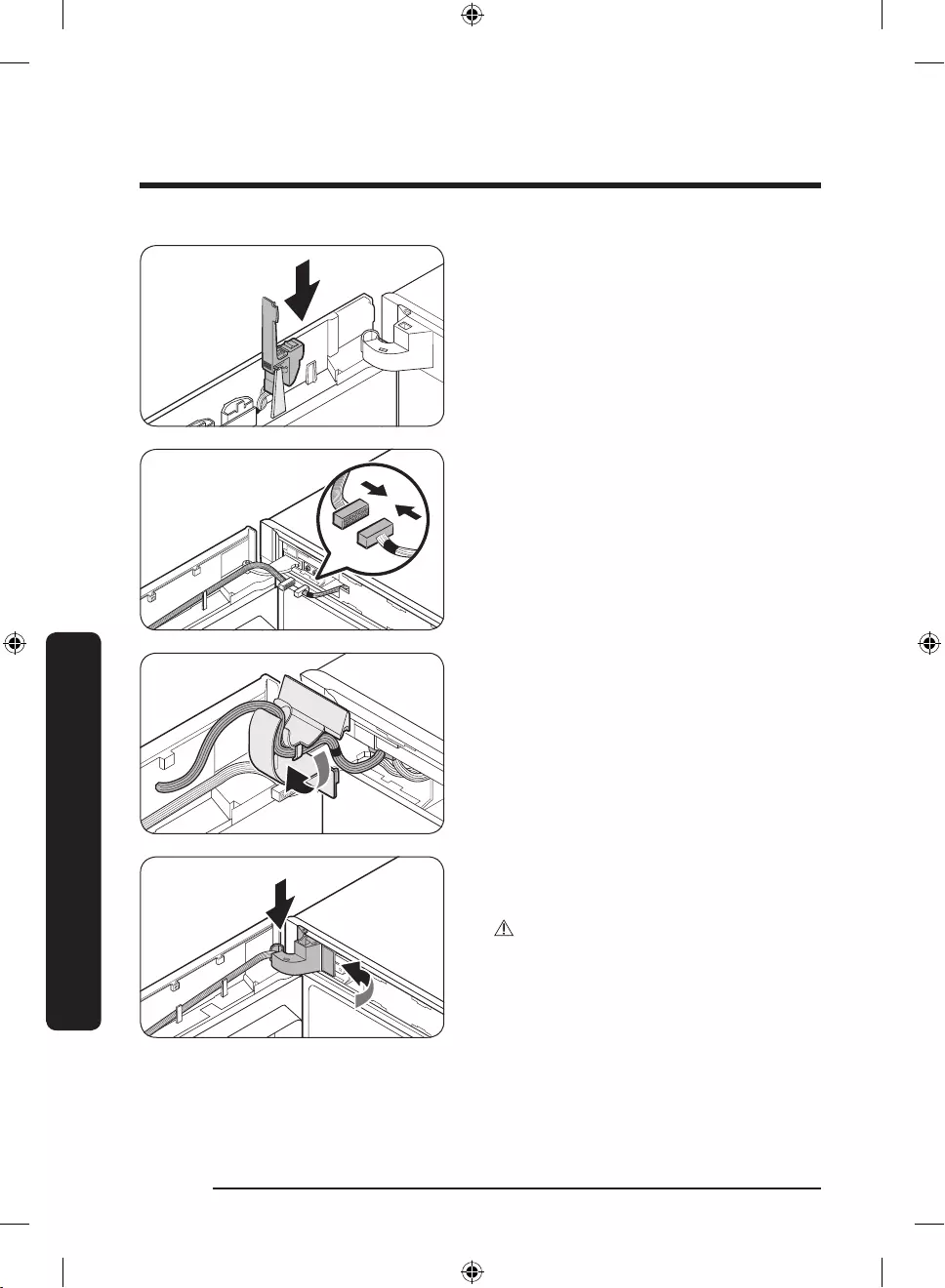
Maintenance
English52
Maintenance
6. Reinsert the dongle cover in the original
position.
7. Connect the connectors from the freezer
door and the main unit. Then, x the
wires on the inner hook of the optional
hinge cover (L).
8. Insert the hinge cover in the top hinge
with the right side rst. Then, press the
bottom of the cover to t.
CAUTION
Make sure all of the wires and connectors
are not stuck in the middle.
Untitled-51 52 2017-03-09 5:07:50
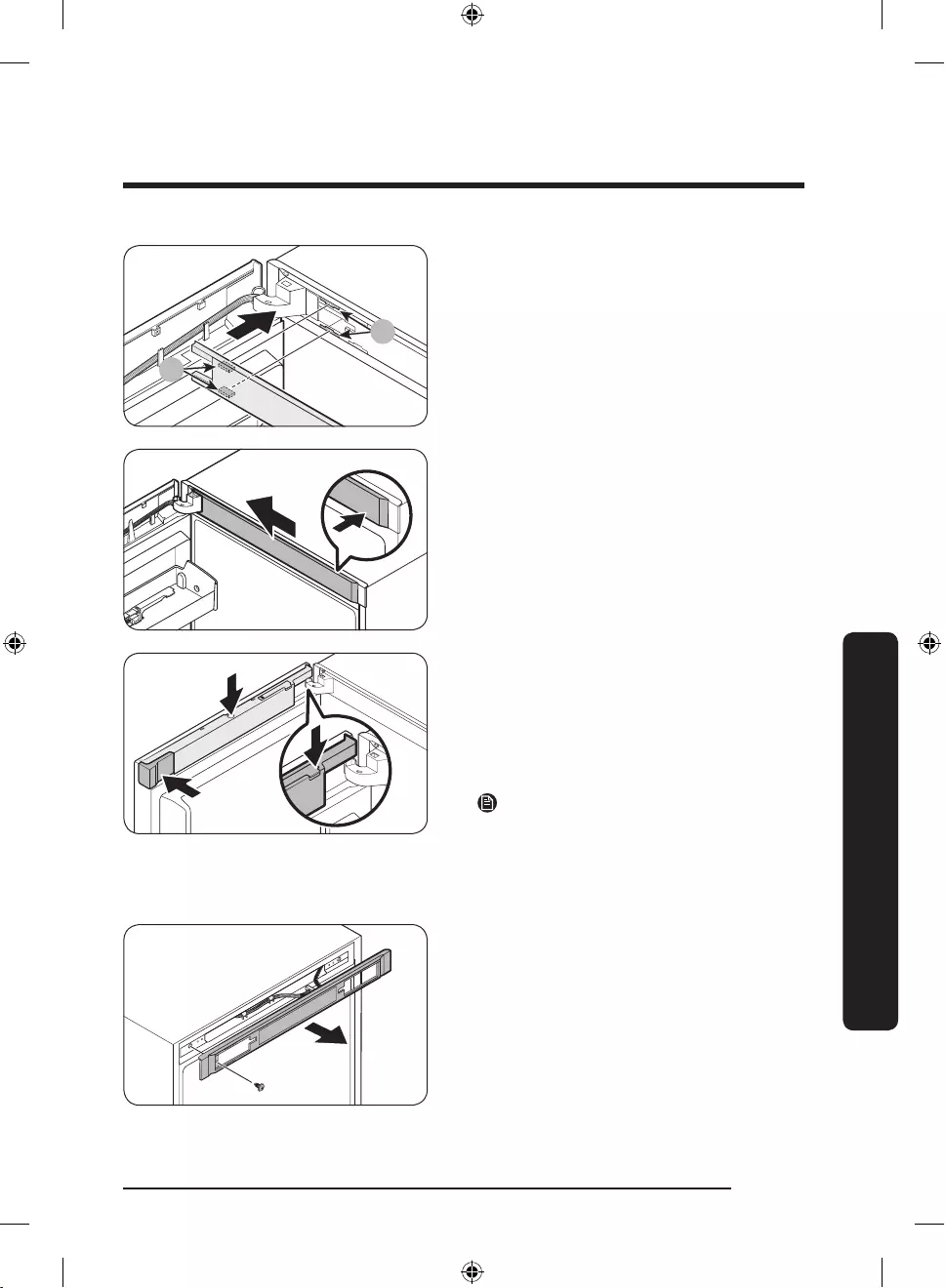
English 53
Maintenance
a
b
9. Insert the top frame cover with the part
(b) tting in the part (a) diagonally.
10. Insert the wire cover through the
opened dongle cover. Turn the cover by
90 degrees to the front, and then push
down to t in.
11. Insert the space cover (L) into the
original position, and then close the
dongle cover.
NOTE
The appearance of the covers differ with
the model.
Display Type B
1. Remove the screw and pull out the
control cover.
Untitled-51 53 2017-03-09 5:07:50
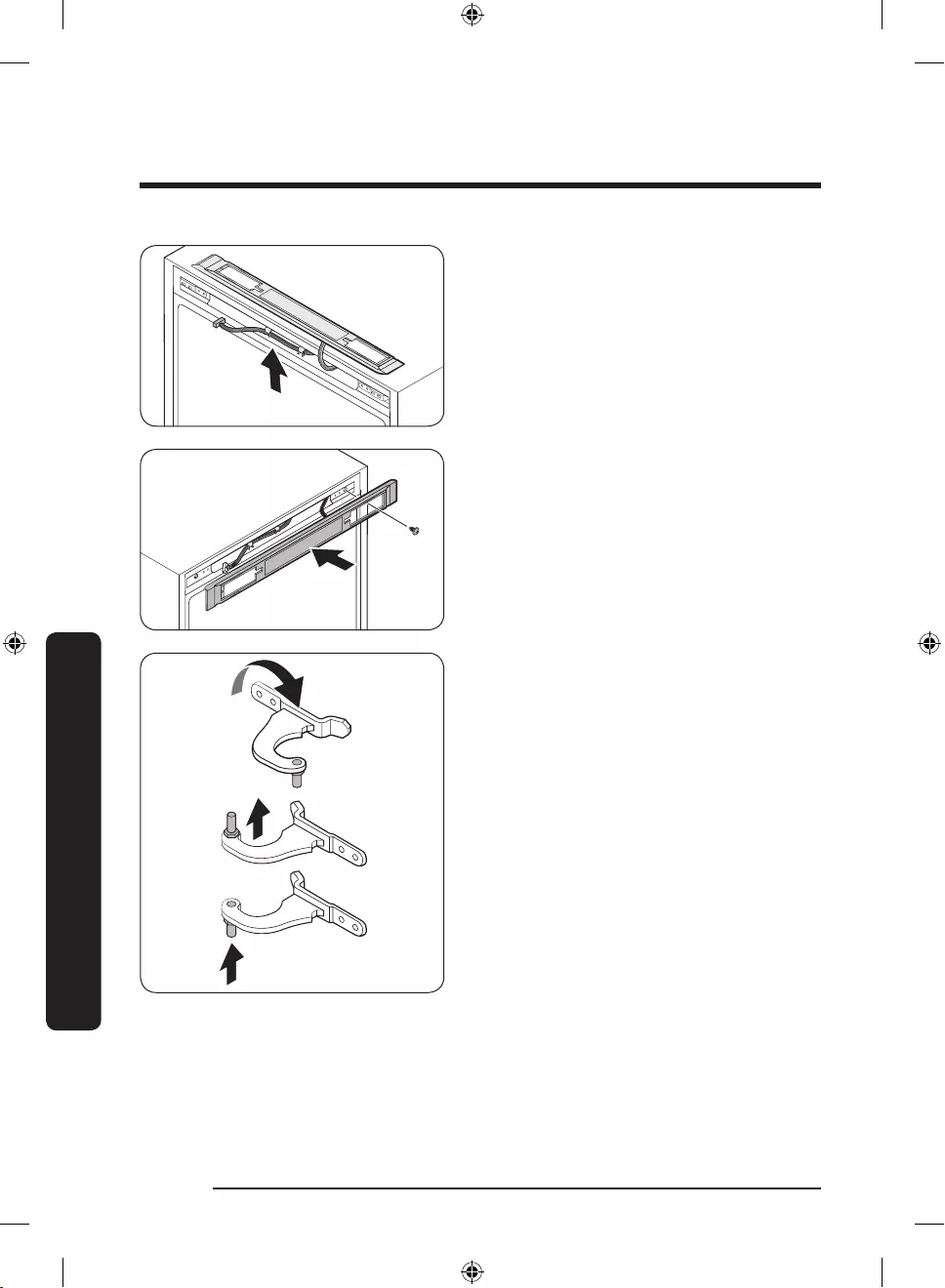
Maintenance
English54
Maintenance
2. Move the connectors and wires to the
opposite side. Insert the control cover,
and then tighten the screws on the
opposite side.
3. Remove the shaft from the top hinge.
Then, reassemble the shaft as shown.
Untitled-51 54 2017-03-09 5:07:50
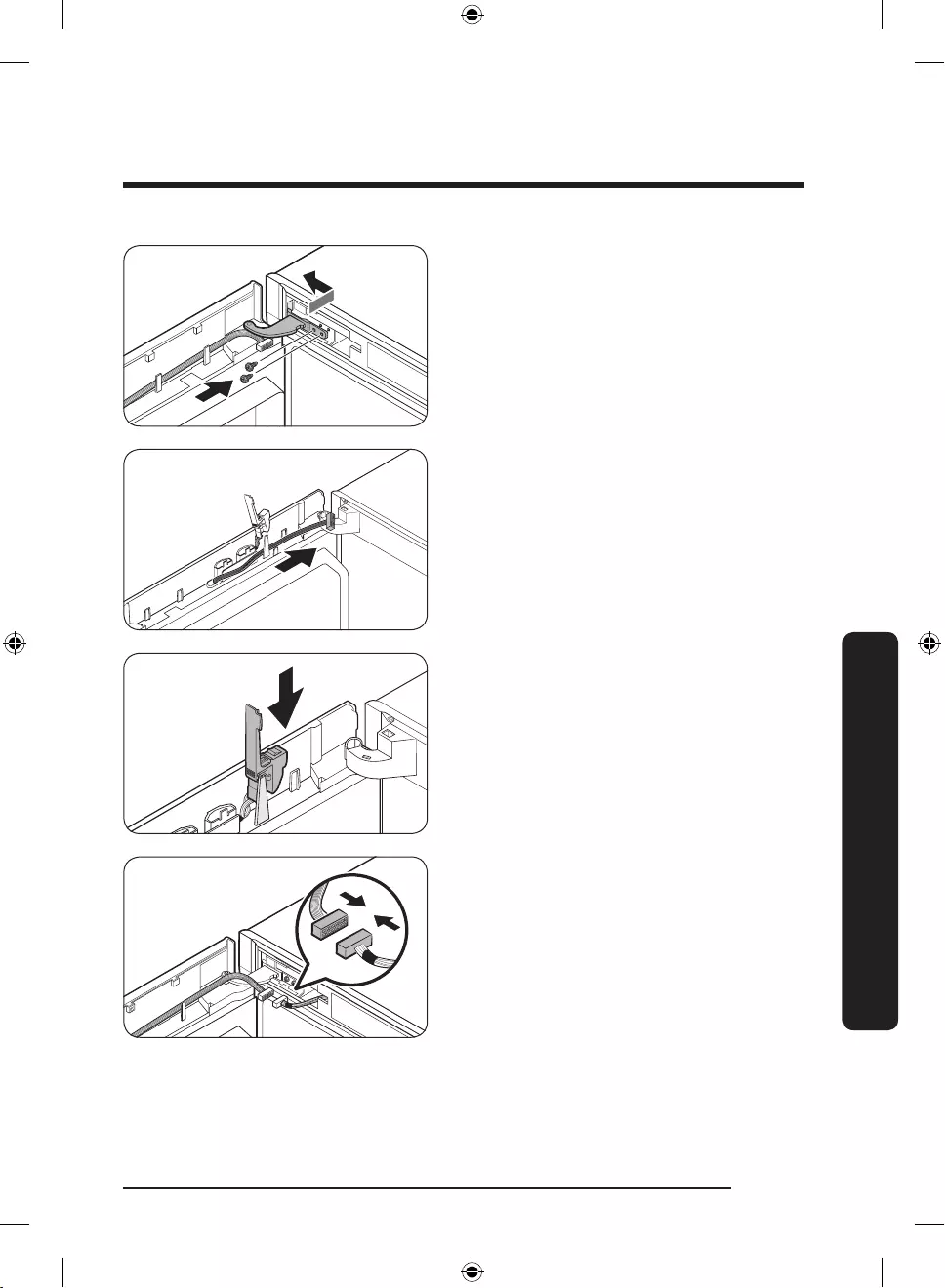
English 55
Maintenance
4. Insert the bottom of the door rst into
the main unit.
5. Insert the top hinge and tighten it with
screws.
• Move the wires to the opposite side
and x them on the inner hook of the
opposite side.
6. Reinsert the dongle cover in the original
position.
7. Connect the connectors from the freezer
door and the main unit. Then, x the
wires on the inner hook of the optional
hinge cover (L).
Untitled-51 55 2017-03-09 5:07:50
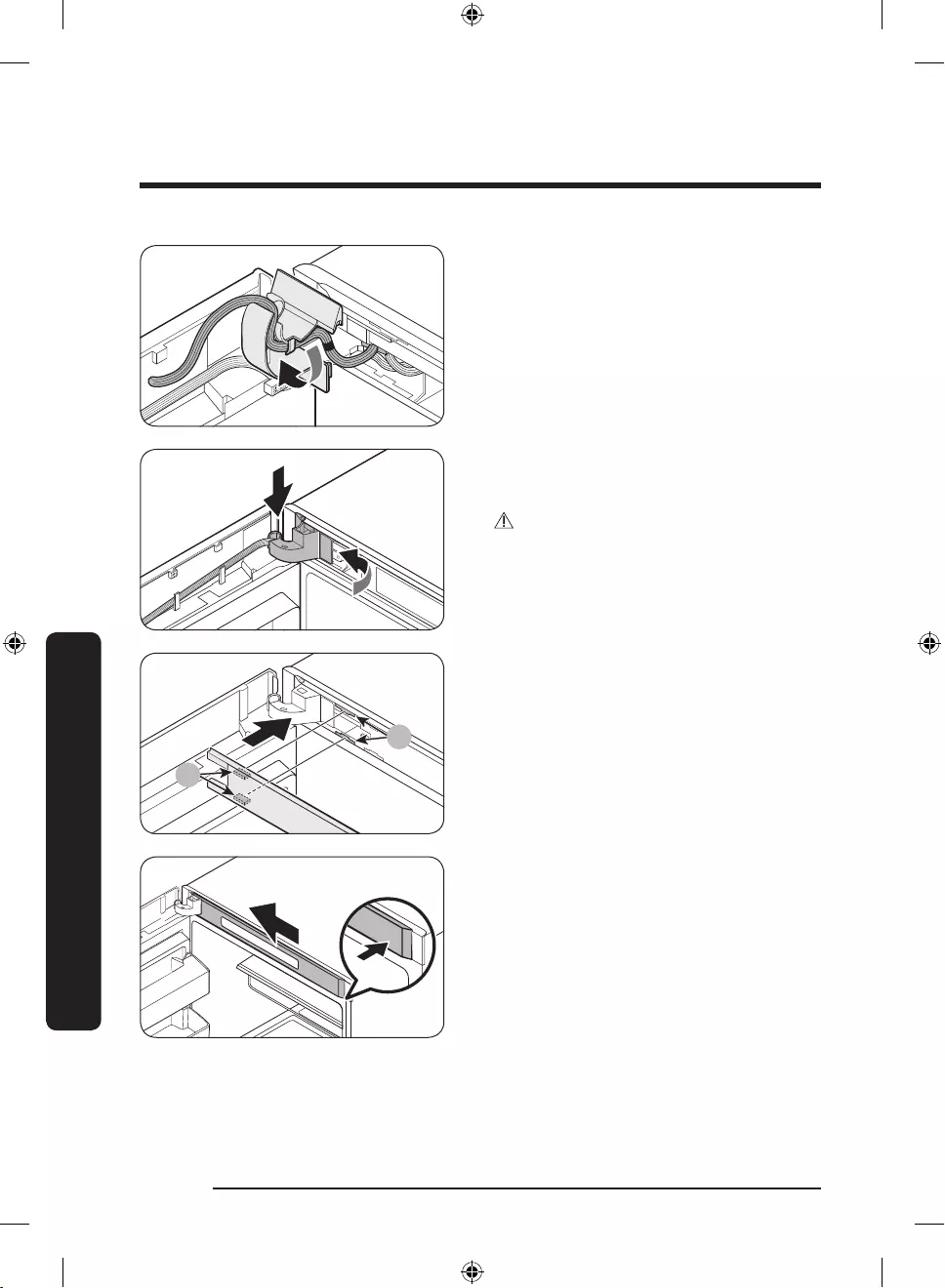
Maintenance
English56
Maintenance
8. Insert the hinge cover in the top hinge
with the right side rst. Then, press the
bottom of the cover to t.
CAUTION
Make sure all of the wires and connectors
are not stuck in the middle.
a
b
9. Insert the top frame cover with the
part (b) tting in the part (a) diagonally.
Then, slide the end of the cover to the
left to lock.
Untitled-51 56 2017-03-09 5:07:51
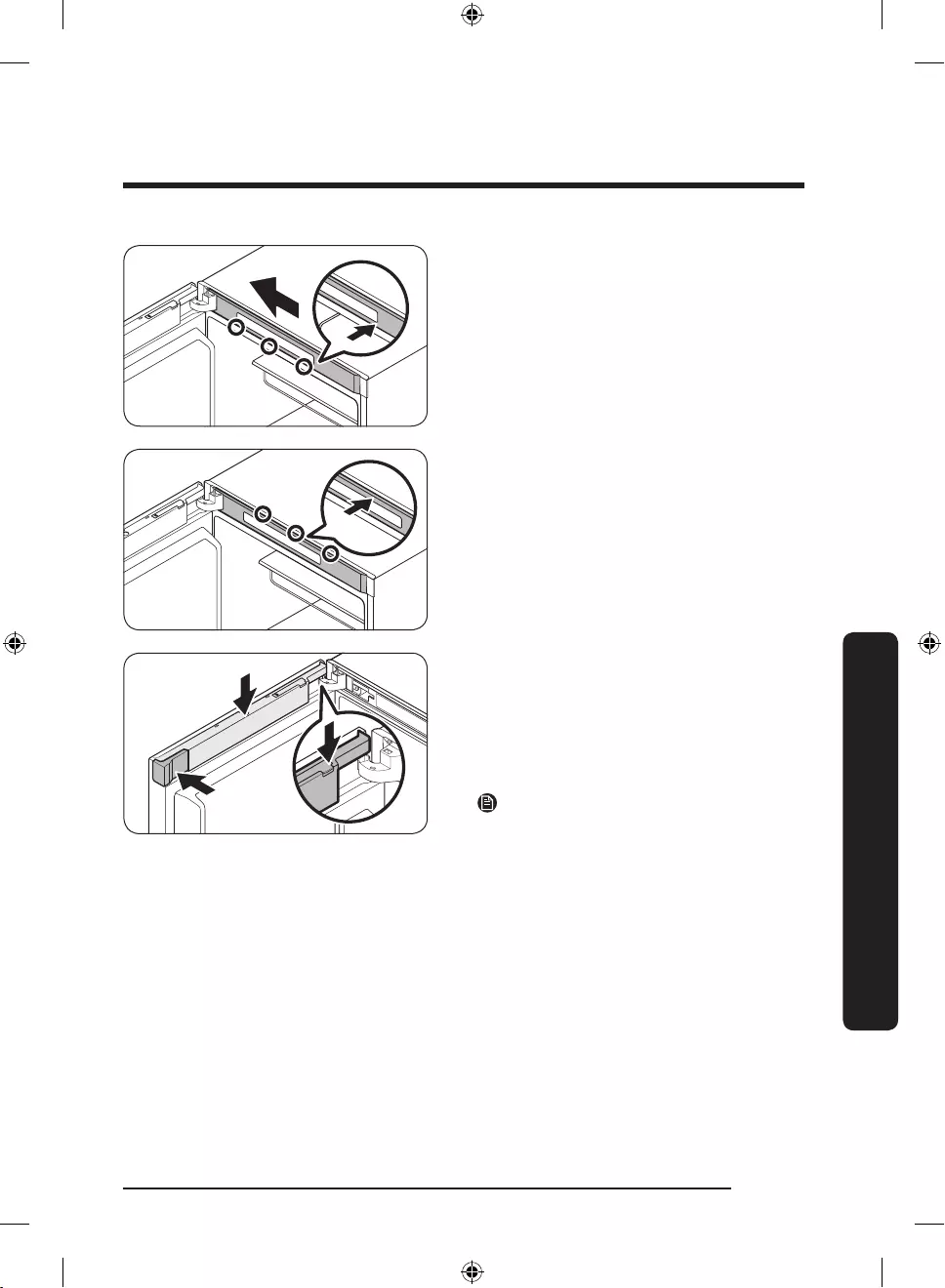
English 57
Maintenance
• For models that have the display panel
on the top of the freezer, push in the
left end of the top frame cover then
the right side by locking the lower and
upper areas in this sequence.
10. Insert the wire cover through the
opened dongle cover. Turn the cover by
90 degrees to the front, and then push
down to t in.
11. Insert the space cover (L) into the
original position, and then close the
dongle cover.
NOTE
The appearance of the covers differ with
the model.
Untitled-51 57 2017-03-09 5:07:51
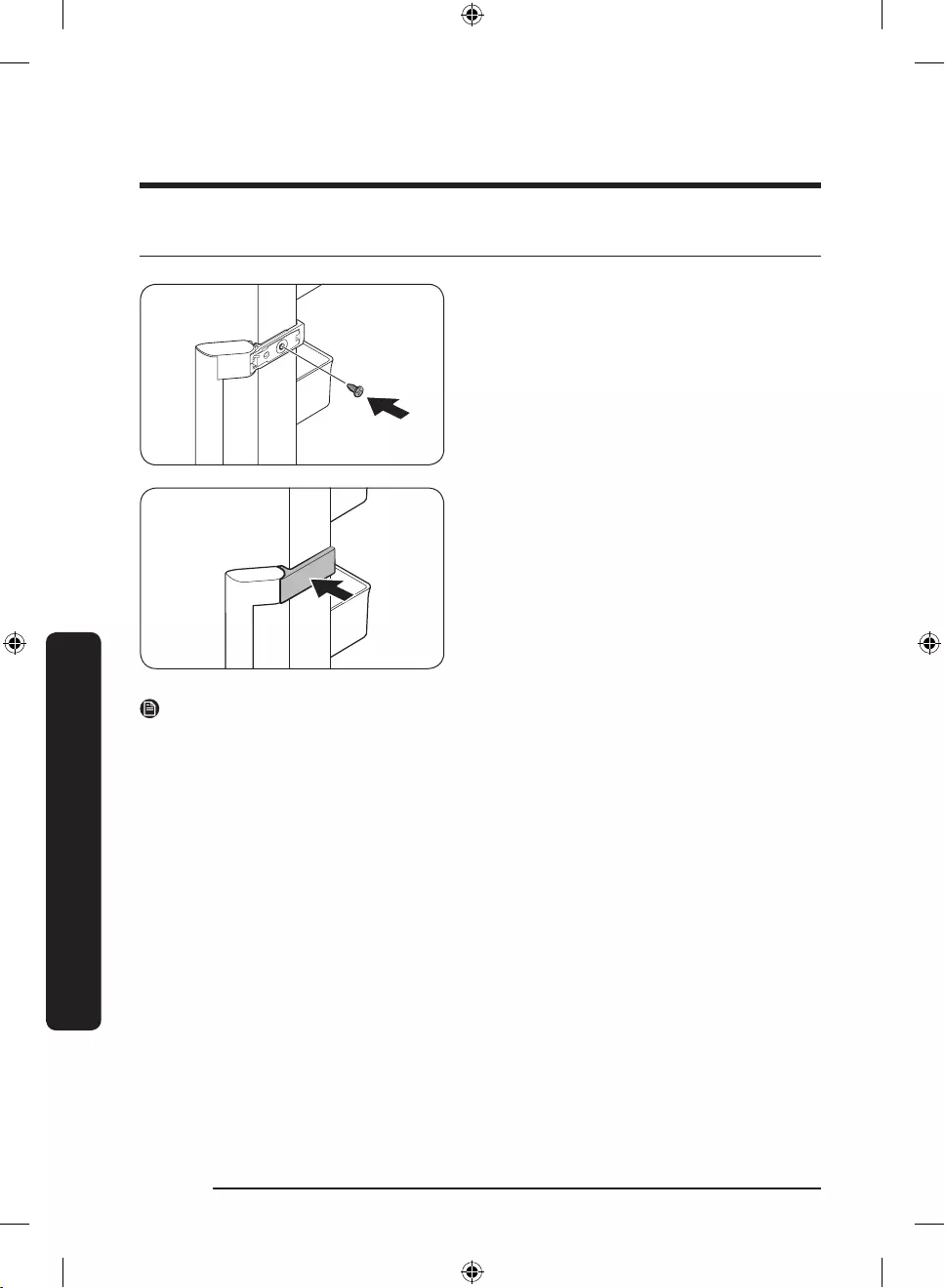
Maintenance
English58
Maintenance
STEP 6 Reattach the handle
1. Insert the handle in the opposite side,
and then tighten the screw.
2. Close the handle cover as shown.
NOTE
You might want to return the doors to the initial position (before reversing the door). In
that case, refer to the instructions above but switch the doors, hinges, and covers back to
the initial position.
Untitled-51 58 2017-03-09 5:07:51
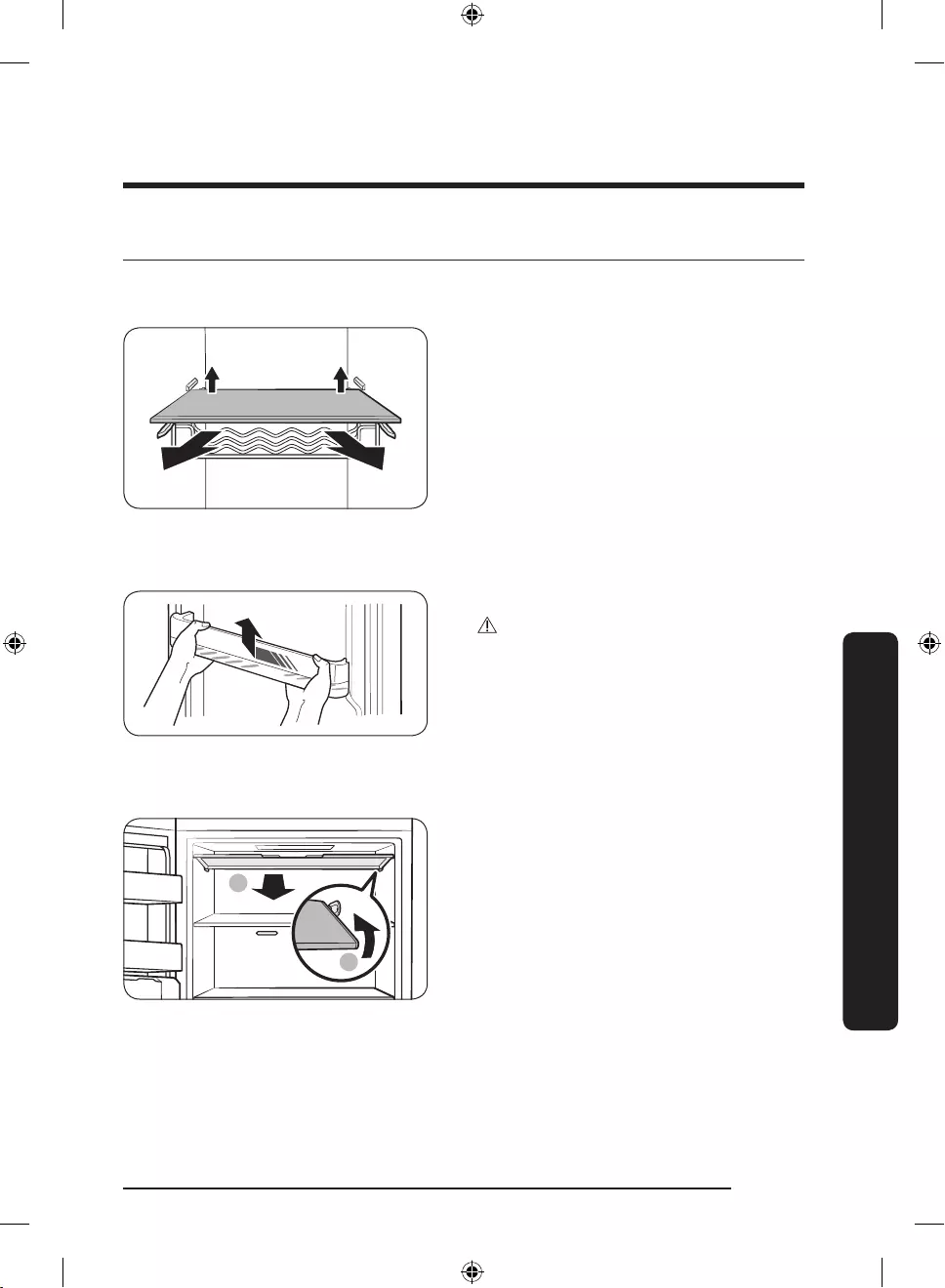
English 59
Maintenance
Handle and care
Shelves
Slightly lift up the rear side of the shelf to
pull out.
Door guards
Slightly lift up and pull out the door guard.
CAUTION
To prevent accidents, empty the door
guards before removing.
Top shelf cover (applicable models only)
1
2
1. Push the right side of the cover inwards
to unhook the cover.
2. Then, pull up the cover to the front to
remove.
Untitled-51 59 2017-03-09 5:07:52
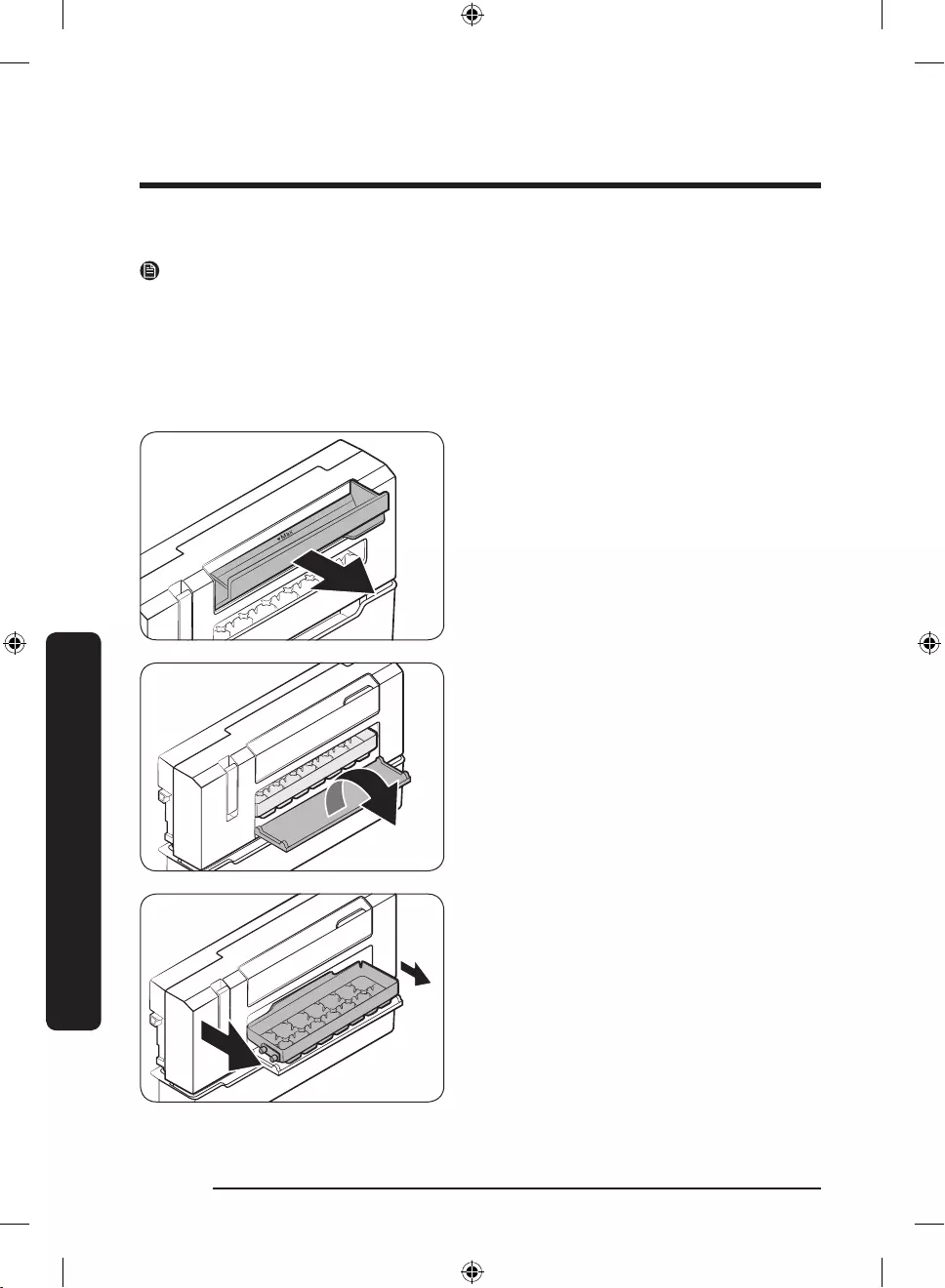
Maintenance
English60
Maintenance
Slim Ice Maker (applicable models only)
NOTE
• When cleaning the component parts of the Slim Ice Maker such as the water bin, ice
bucket, and ice template, make sure they are completely dry after cleaning.
• When cleaning the Slim Ice Maker unit, make sure to completely dry the inner and outer
parts of the unit after cleaning. Incomplete dryness may cause the ice maker lever to
fail. In this case, dry the Slim Ice Maker completely for 2-3 days. Then, try again.
To remove the component parts
Water bin
Fully open the water bin, and then pull out.
Ice template
1. Open the ice template cover to reveal
the ice template.
2. Slightly pull out the left side of the ice
template, and then pull out the other
side to remove.
Untitled-51 60 2017-03-09 5:07:52
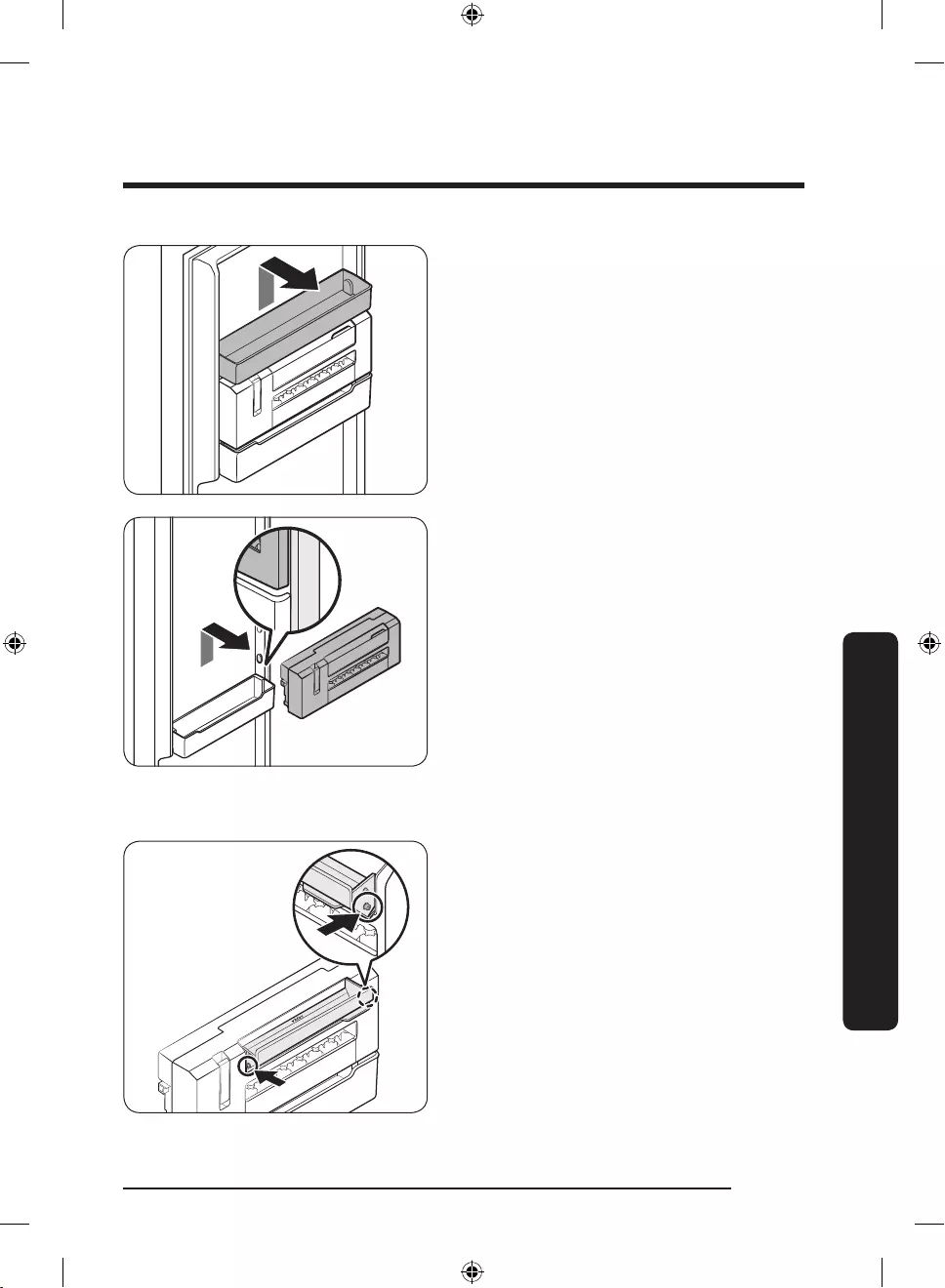
English 61
Maintenance
Slim Ice Maker
1. Remove the multipurpose bin rst,
which is immediately above the Slim Ice
Maker.
2. While holding the marked area on either
side of the Slim Ice Maker unit with both
hands, lift up the unit and pull out to the
front.
To reinsert the component parts
Water bin
Fit either side of the water bin into the
corresponding hook on the water bin
housing. Make sure to t until you hear a
clicking sound.
Untitled-51 61 2017-03-09 5:07:52
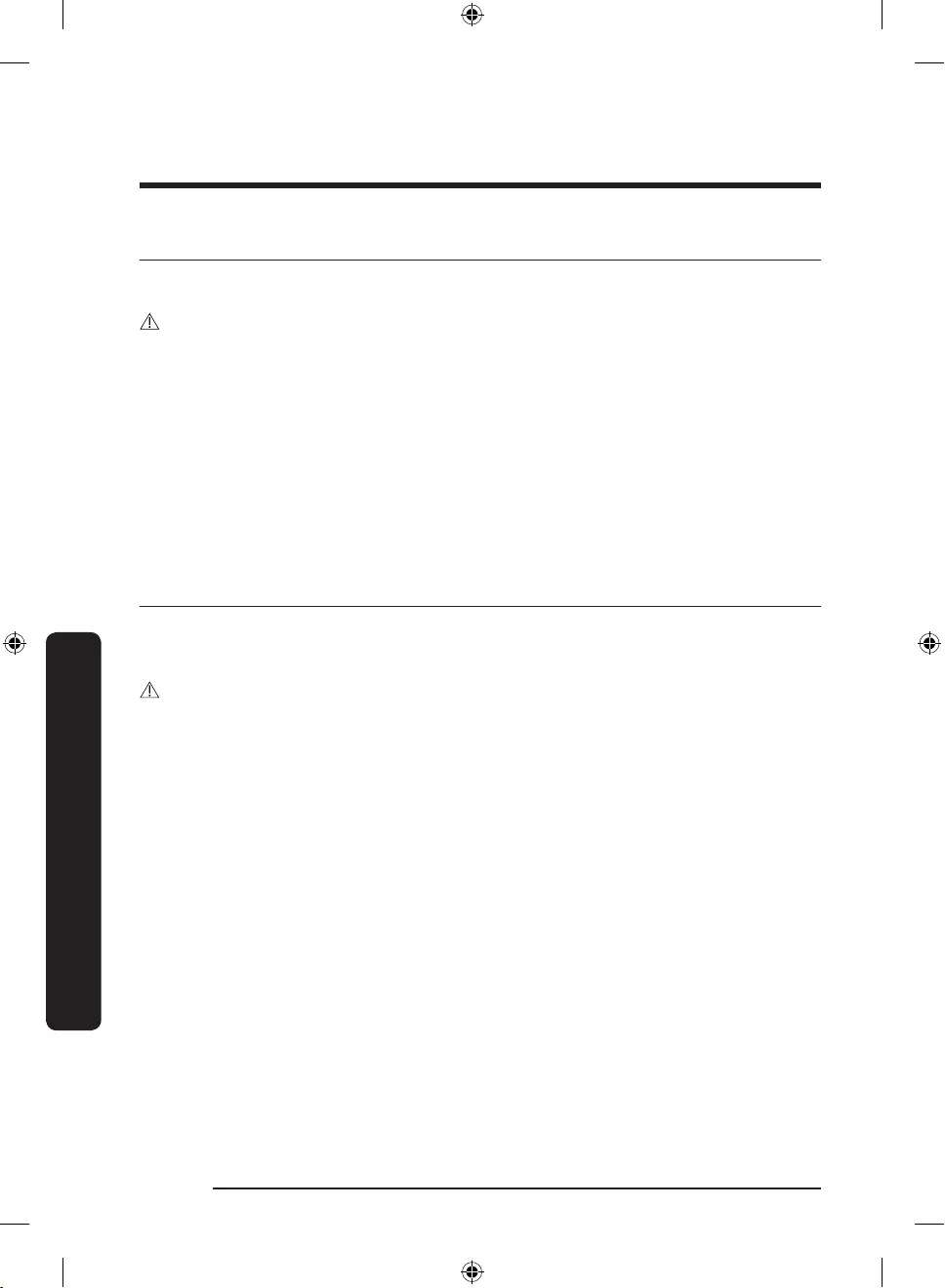
Maintenance
English62
Maintenance
Cleaning
Interior and exterior
WARNING
• Do not use benzene, thinner, or home/car detergent such as Clorox™ for cleaning
purposes. They may damage the surface of the refrigerator and cause a re.
• Do not spray water onto the refrigerator. This may cause electric shock.
Regularly use a dry cloth to remove all foreign substances such as dust or water from the
power plug terminals and contact points.
1. Unplug the power cord.
2. Use a moistened, soft, lint-free cloth or paper towel to clean the refrigerator’s interior
and exterior.
3. When done, use a dry cloth or paper towel to dry well.
4. Plug in the power cord.
Replacement
LED Lamps
To replace the lamps of the refrigerator, contact a local Samsung service centre.
WARNING
• The lamps are not user-serviceable. Do not attempt to replace a lamp yourself. This can
cause electric shock.
Untitled-51 62 2017-03-09 5:07:53
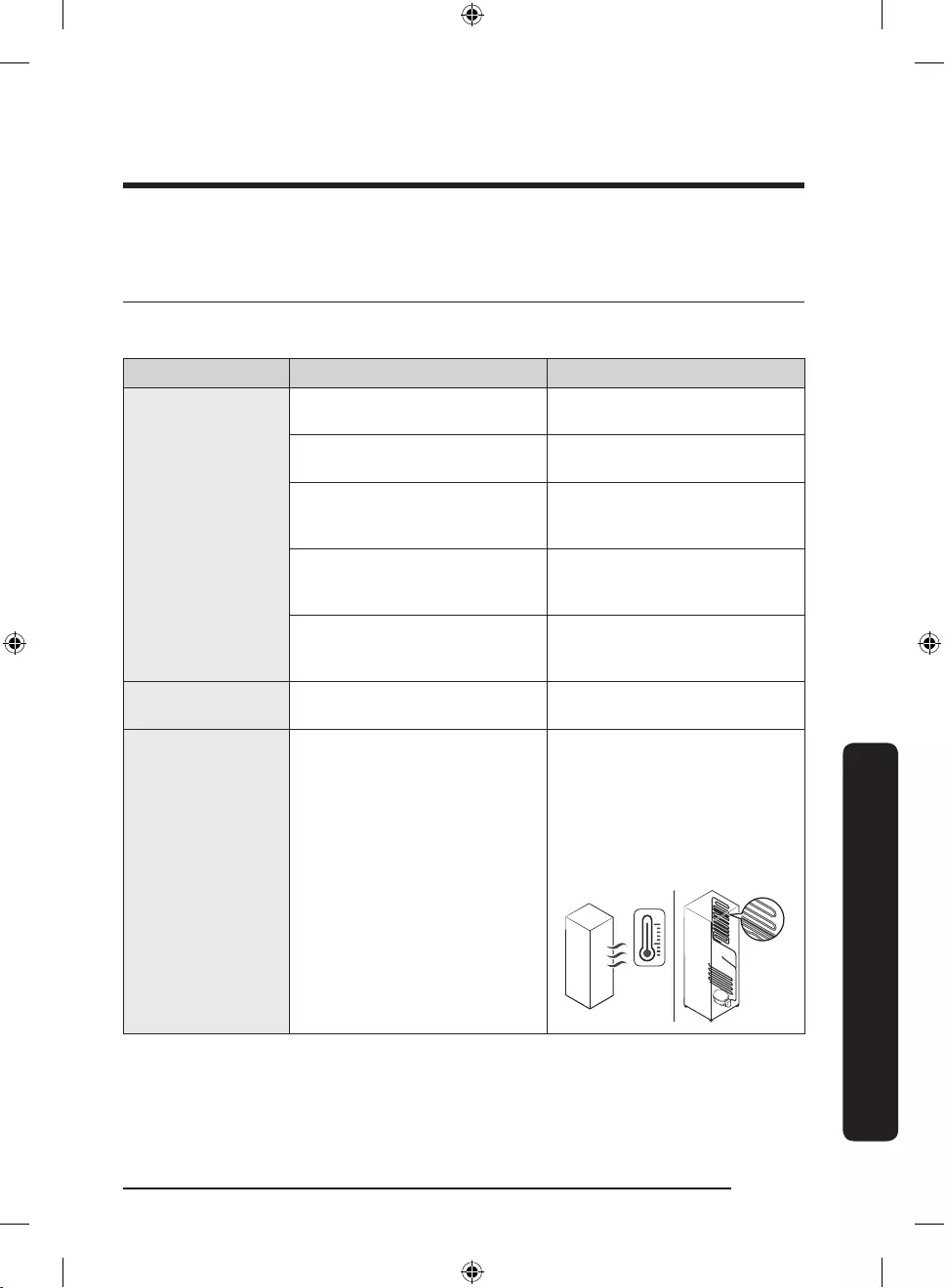
English 63
Troubleshooting
Before calling for service, review the checkpoints below. Any service calls regarding
normal situations (No Defect Cases) will be charged to users.
General
Temperature
Symptom Possible causes Solution
Freezer does not
operate.
Freezer
temperature is
warm.
• Power cord is not plugged in
properly.
• Properly plug in the power
cord.
• Temperature control is not
set correctly. • Set the temperature lower.
• Refrigerator is located near
a heat source or direct
sunlight.
• Keep the refrigerator away
from direct sunlight or a
heat source.
• Not enough clearance
between refrigerator and
sides/rear.
• Make sure there are at least
5 cm from the rear and
sides.
• The refrigerator is
overloaded. Food is blocking
the refrigerator vents.
• Do not overload the
refrigerator. Do not allow
food to block ventilation.
Freezer is over-
cooling.
• Temperature control is not
set correctly. • Set the temperature higher.
Interior wall is hot. • Refrigerator has heat-proof
piping in the interior wall.
• To prevent condensation
from forming, the
refrigerator has heat-proof
piping in the front corners.
If the ambient temperature
rises, this equipment may
not work effectively. This is
not a system failure.
Troubleshooting
Untitled-51 63 2017-03-09 5:07:53
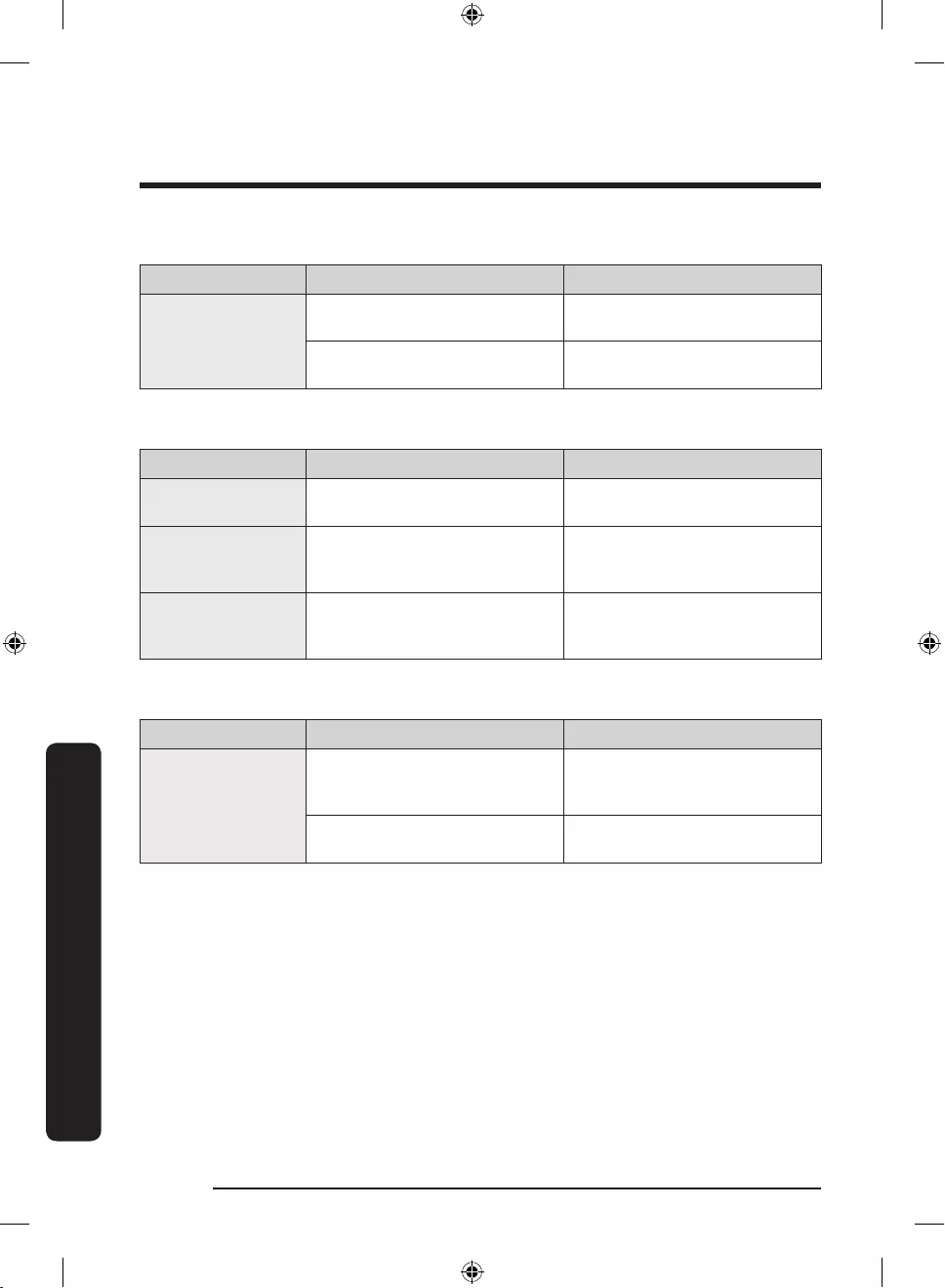
Troubleshooting
English64
Troubleshooting
Odors
Symptom Possible causes Solution
Refrigerator has
odors.
• Spoiled food. • Clean the refrigerator and
remove any spoiled food.
• Food with strong odors. • Make sure strong smelling
food is wrapped airtight.
Frost
Symptom Possible causes Solution
Frost around the
vents. • Food is blocking the vents. • Make sure no food blocks
the refrigerator vents.
Frost on interior
walls. • Door is not closed properly.
• Make sure food does not
block the door. Clean the
door gasket.
Fruits or vegetables
are frozen.
• Fruits or vegetables are
stored in the Fresh/Chef
Zone.
• The Fresh/Chef Zone is only
for meat/sh.
Condensation
Symptom Possible causes Solution
Condensation forms
on the interior
walls.
• If door is left open, moisture
enters the refrigerator.
• Remove the moisture and do
not open the door for a long
time.
• Food with high moisture
content.
• Make sure food is wrapped
airtight.
Untitled-51 64 2017-03-09 5:07:53
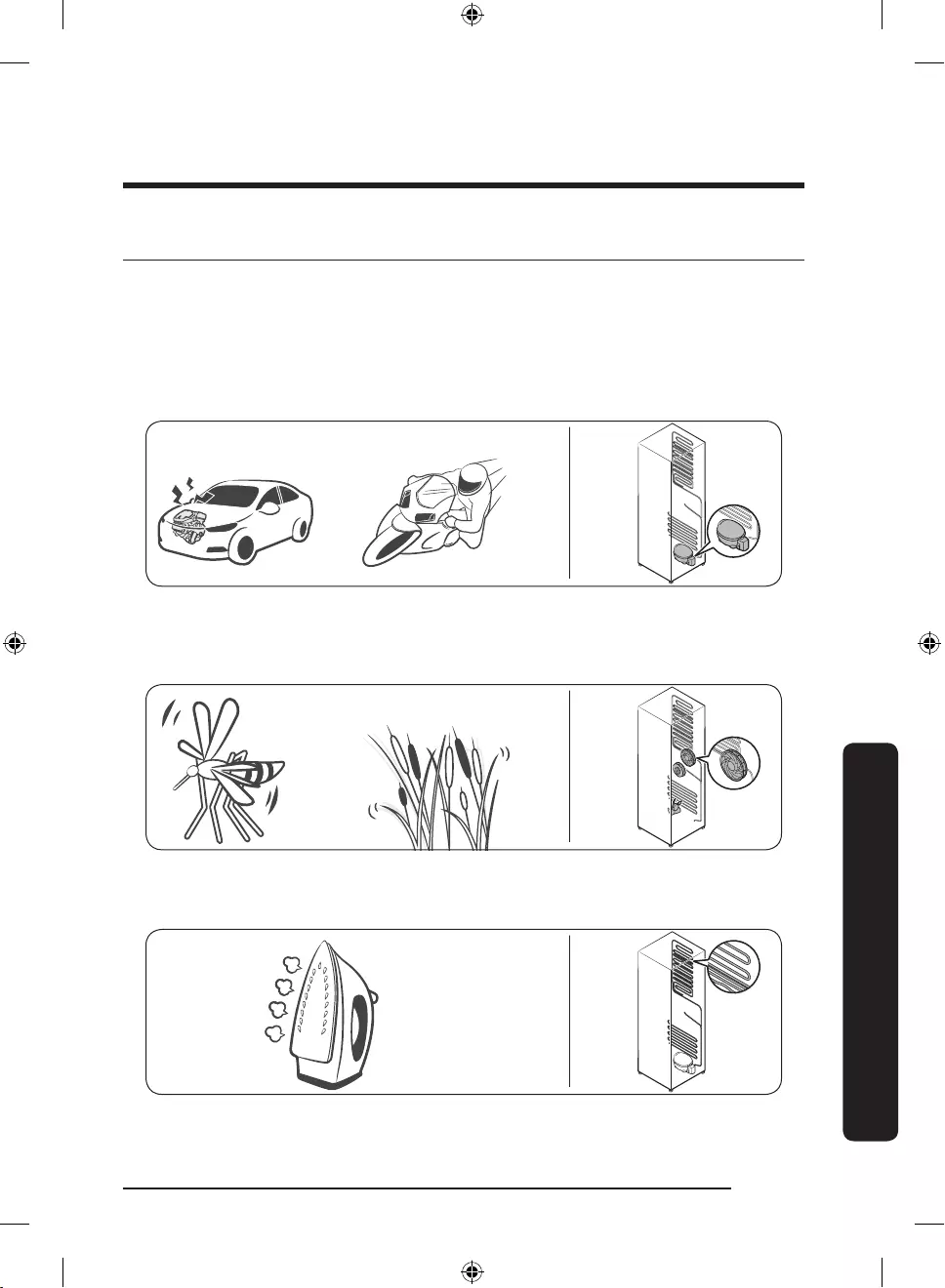
English 65
Troubleshooting
Do you hear abnormal sounds from the refrigerator?
Before calling for service, review the checkpoints below. Any service calls related to
normal sounds will be charged to the user.
These sounds are normal.
• When starting or ending an operation, the refrigerator may make sounds similar to a
car engine igniting. As the operation stabilizes, the sounds will decrease.
Clicking!
or Chirping!
Buzzing!
• While the fan is operating, these sounds may occur. When the refrigerator reaches the
set temperature, no fan sound will occur.
SSSRRR! Whir!
• During a defrost cycle, water may drip on the defrost heater, causing sizzling sounds.
HiSS!
Untitled-51 65 2017-03-09 5:07:53
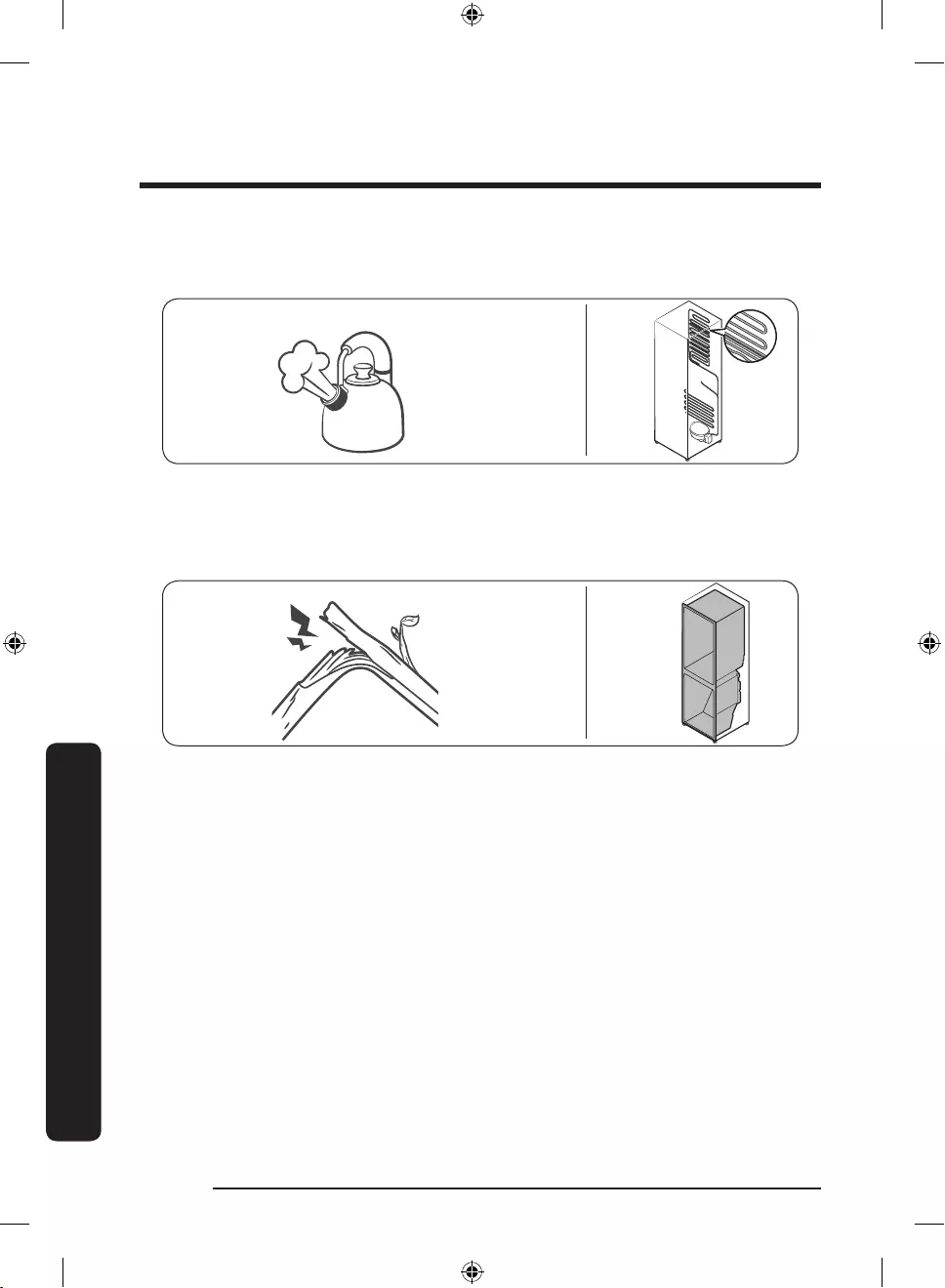
Troubleshooting
English66
Troubleshooting
• As the refrigerator cools or freezes, refrigerant gas moves through sealed pipes, causing
bubbling sounds.
Bubbling!
• As the refrigerator temperature increases or decreases, plastic parts contract and
expand, creating knocking noises. These noises occur during the defrosting cycle or
when electronic parts are working.
Cracking!
• For ice maker models: When the water valve opens to ll the ice maker, buzzing sounds
may occur.
• Due to pressure equalizing when opening and closing the refrigerator door, whooshing
sounds may occur.
Untitled-51 66 2017-03-09 5:07:53
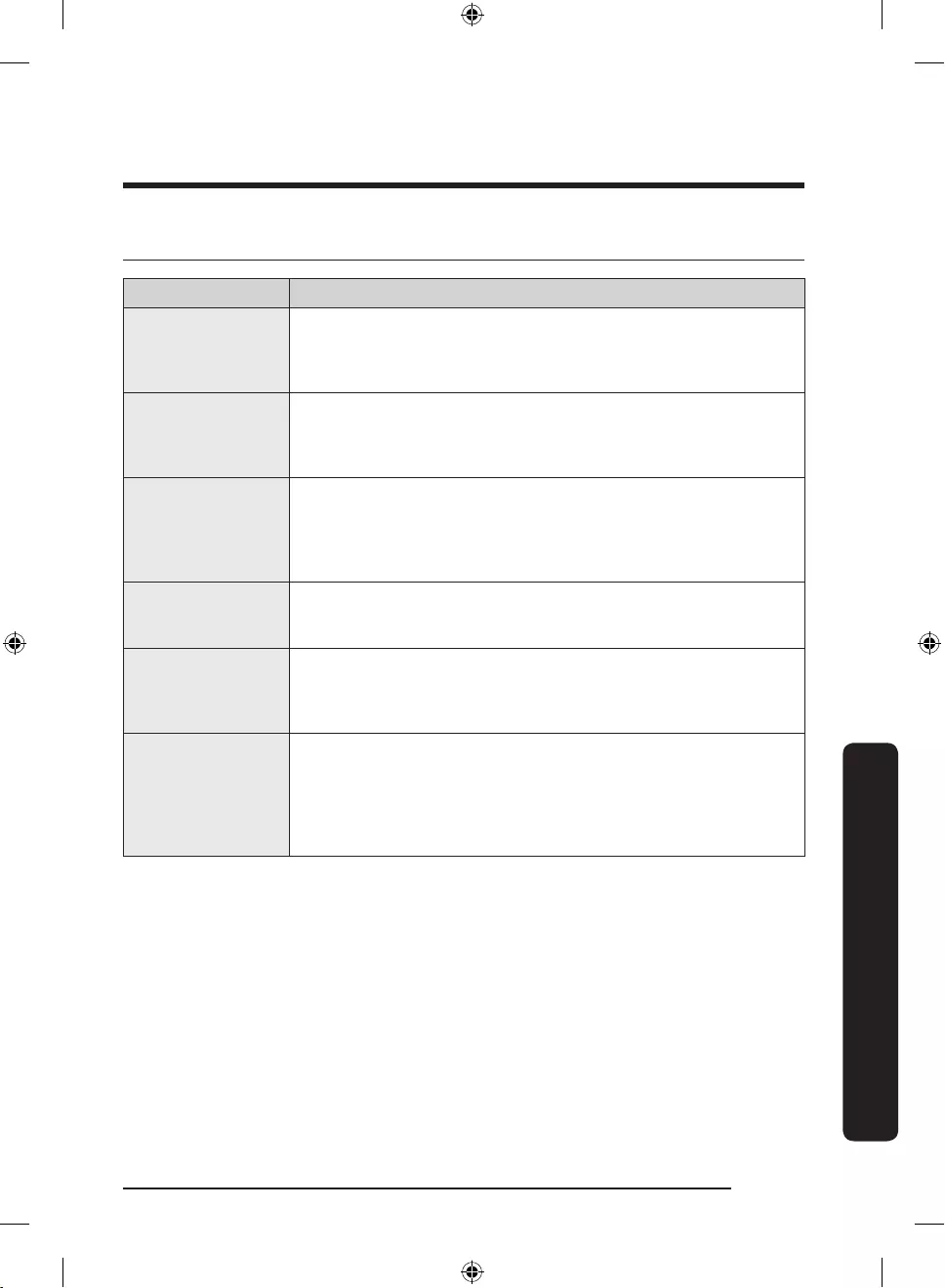
English 67
Troubleshooting
Samsung Smart Home
Symptom Action
Could not nd
“Samsung Smart
Home” on the app
market.
• The Samsung Smart Home app is available on smartphones that
run Android 4.0 (ICS) or higher, or iOS 8.0 or higher.
The Samsung Smart
Home app fails to
operate.
• The Samsung Smart Home app is available on applicable
models only.
• The old Samsung Smart Refrigerator app cannot connect with
Samsung Smart Home models.
The Samsung
Smart Home app is
installed but is not
connected to my
refrigerator.
• You must log into your Samsung account to use the app.
• Make sure that your router is operating normally.
• If you have not connected your refrigerator to the Samsung
Smart Home App after the app was installed, you must make
connection using the device registration function of the app.
Could not log into
the app.
• You must log into your Samsung account to use the app.
• If you don’t have a Samsung account, follow the app’s onscreen
instructions to create one.
An error message
appears when I
try to register my
refrigerator.
• Easy Connection may fail due to the distance from your access
point (AP) or electrical interference from the surrounding
environment. Wait a moment and try again.
The Samsung
Smart Home app
is successfully
connected to my
refrigerator but
does not run.
• Exit and restart the Samsung Smart Home app, or disconnect
and reconnect the router.
• Unplug the power cord of the refrigerator, and then plug it in
again after 1 minute.
Untitled-51 67 2017-03-09 5:07:53
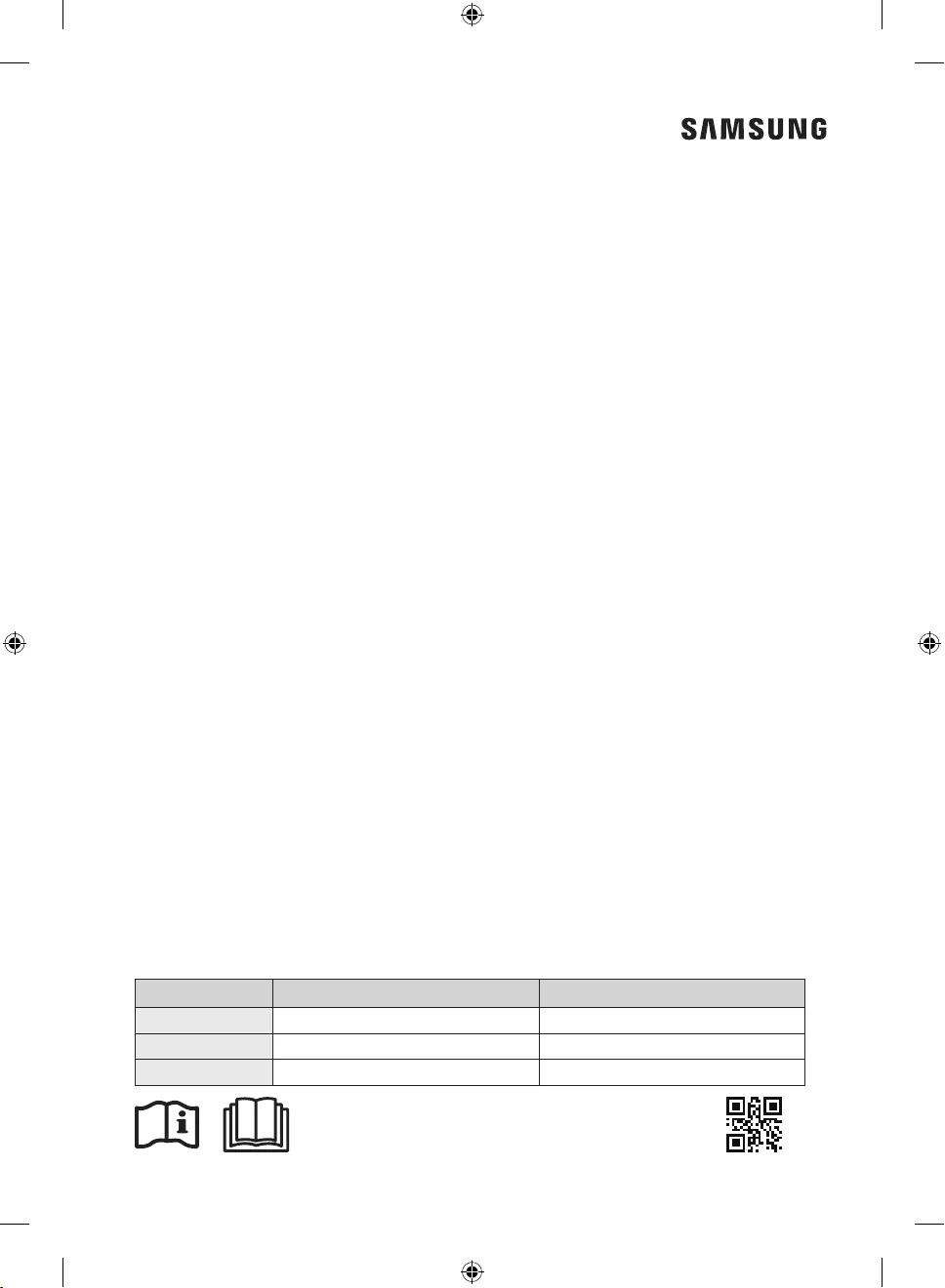
Contact SAMSUNG WORLD WIDE
If you have any questions or comments relating to Samsung products, please contact the
SAMSUNG customer care center.
Country Contact Center Web Site
SINGAPORE 1800-SAMSUNG(726-7864) www.samsung.com/sg/support
UK 0330 SAMSUNG (7267864) www.samsung.com/uk/support
SOUTH AFRICA 0860 SAMSUNG (726 7864) www.samsung.com/support
DA68-03561A-01
Untitled-51 68 2017-03-09 5:07:54